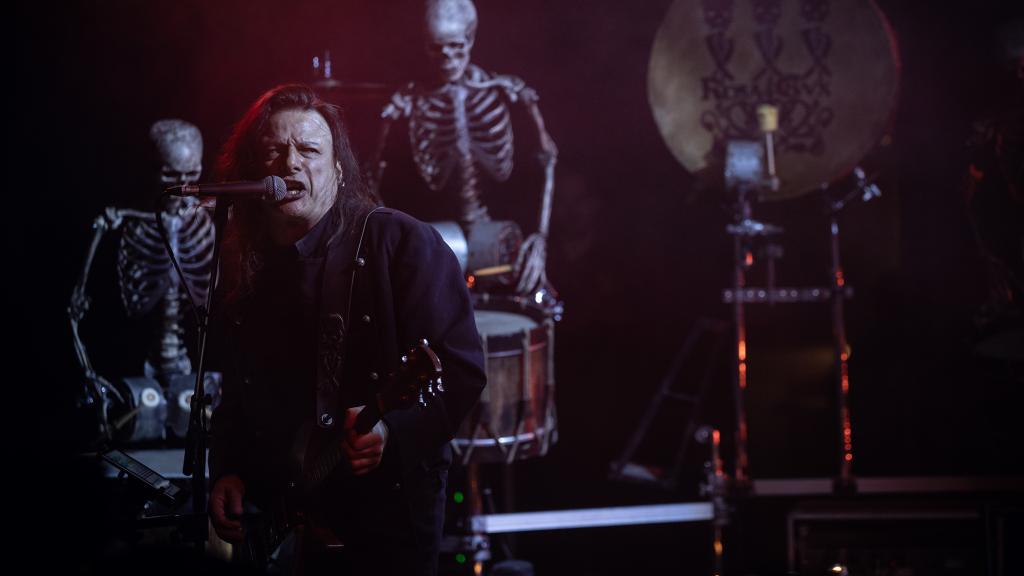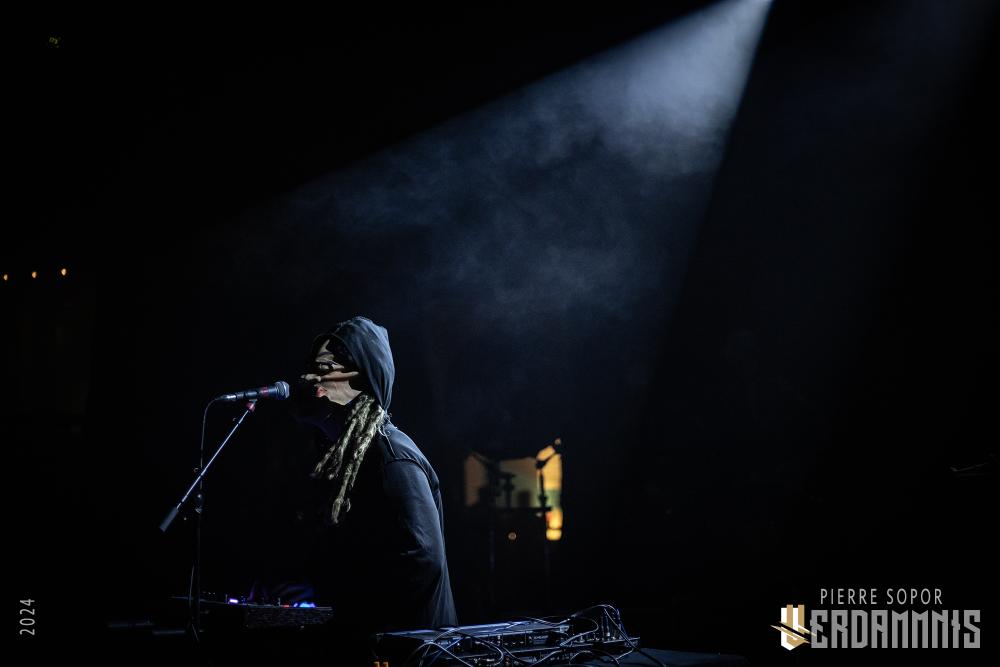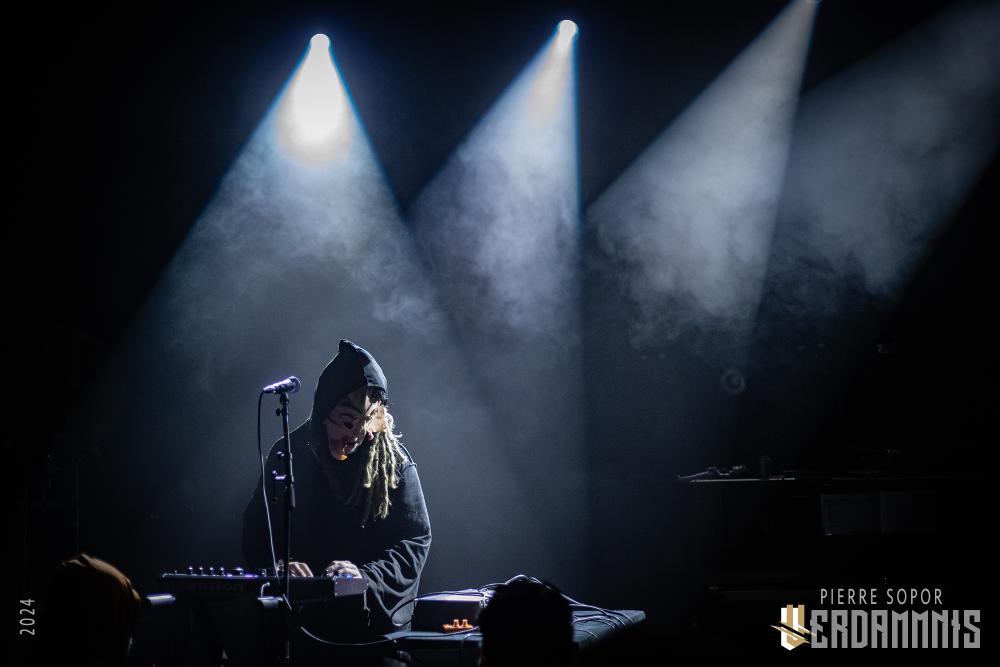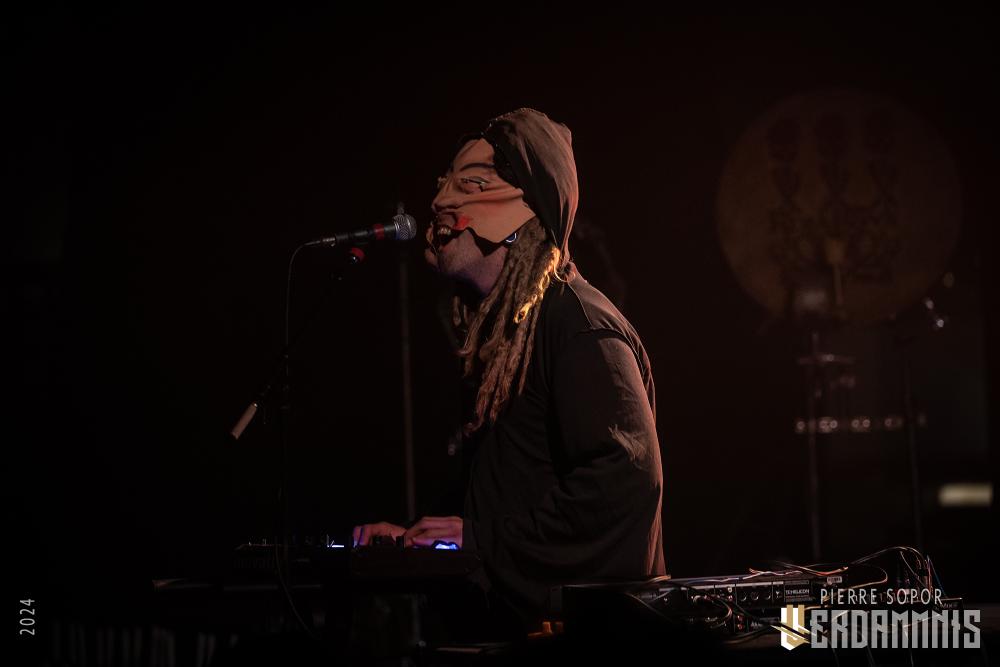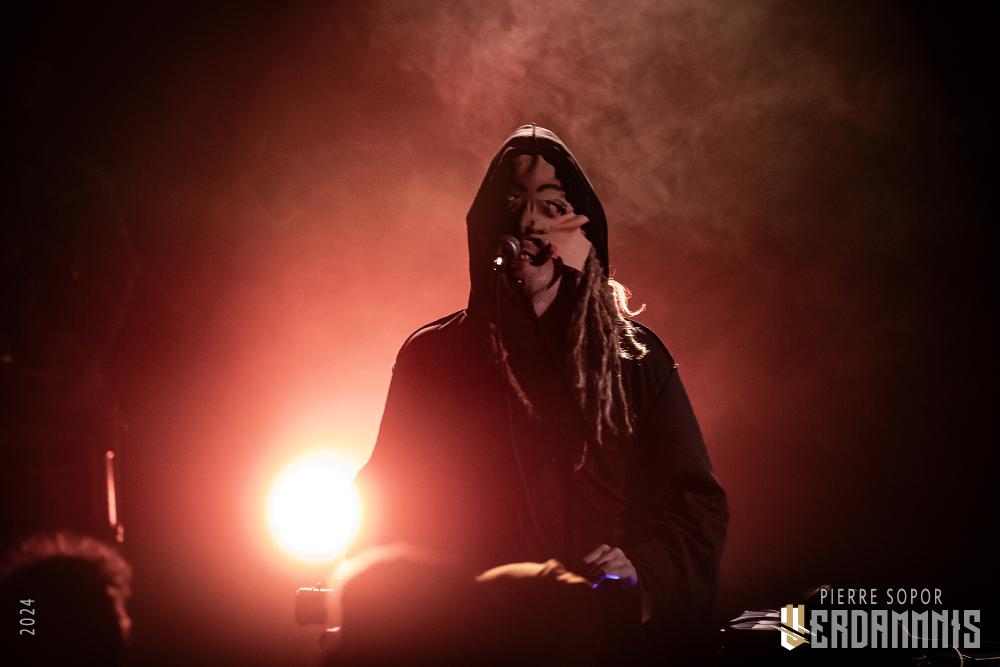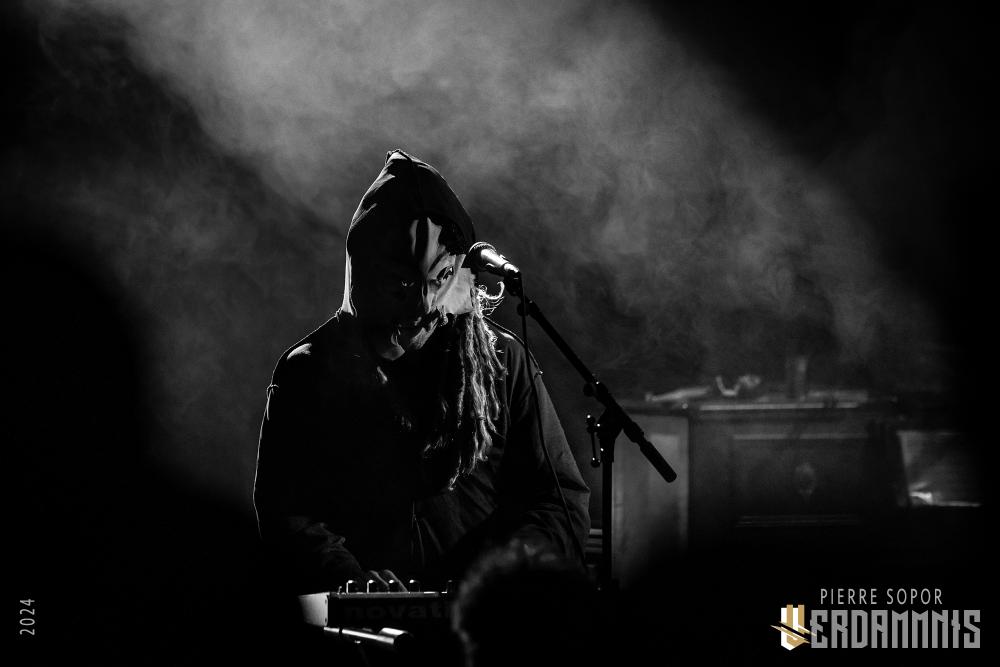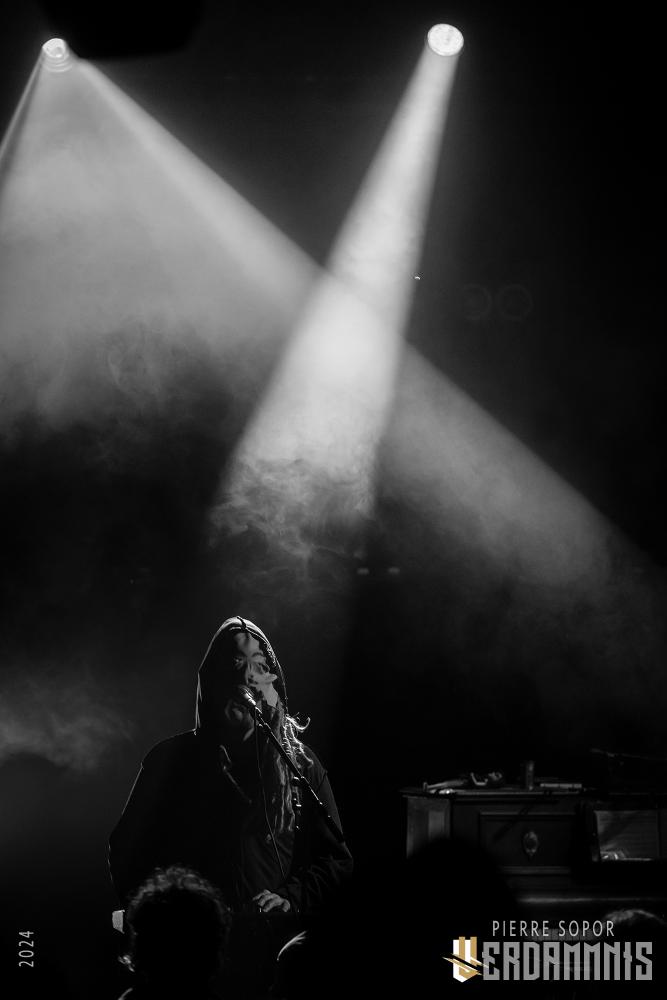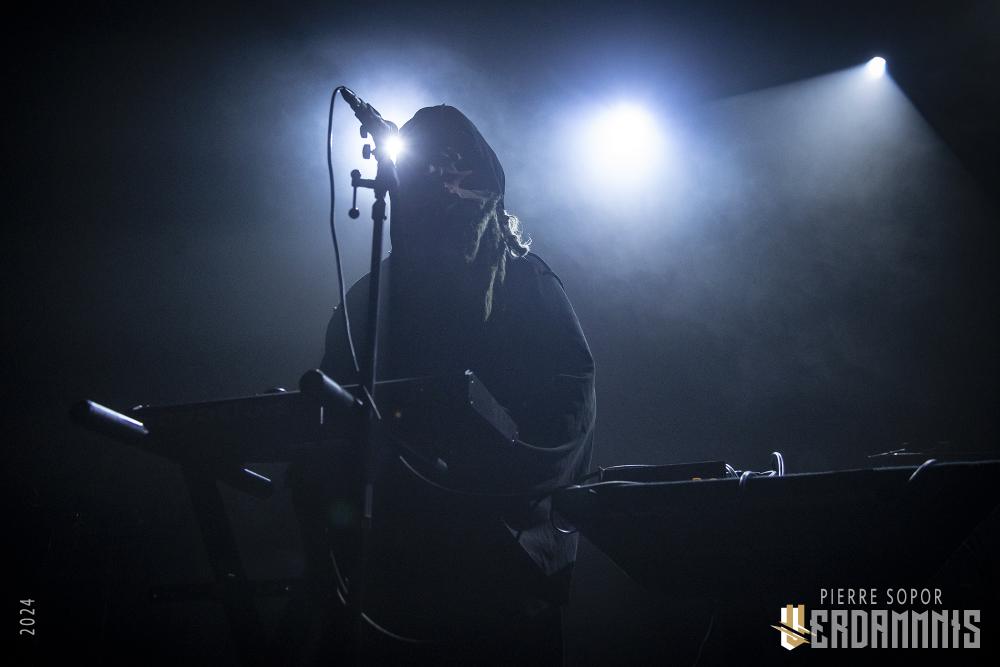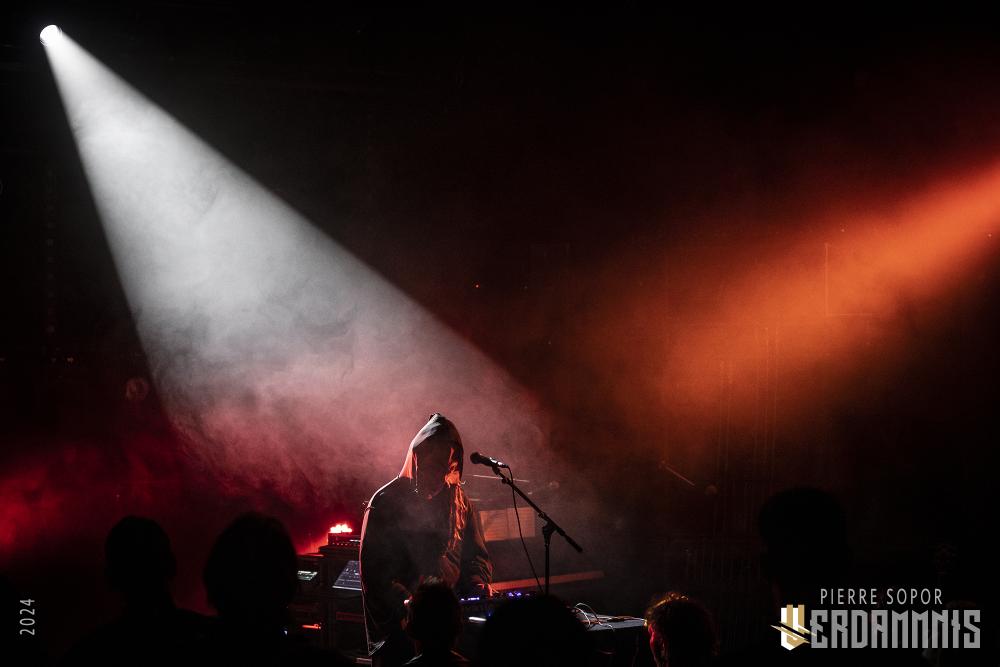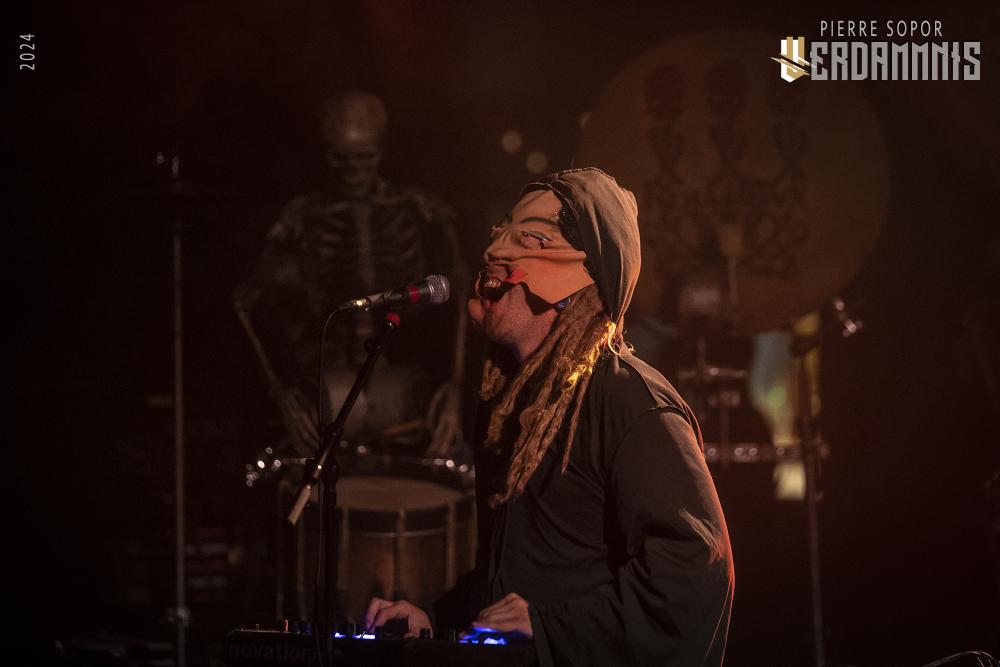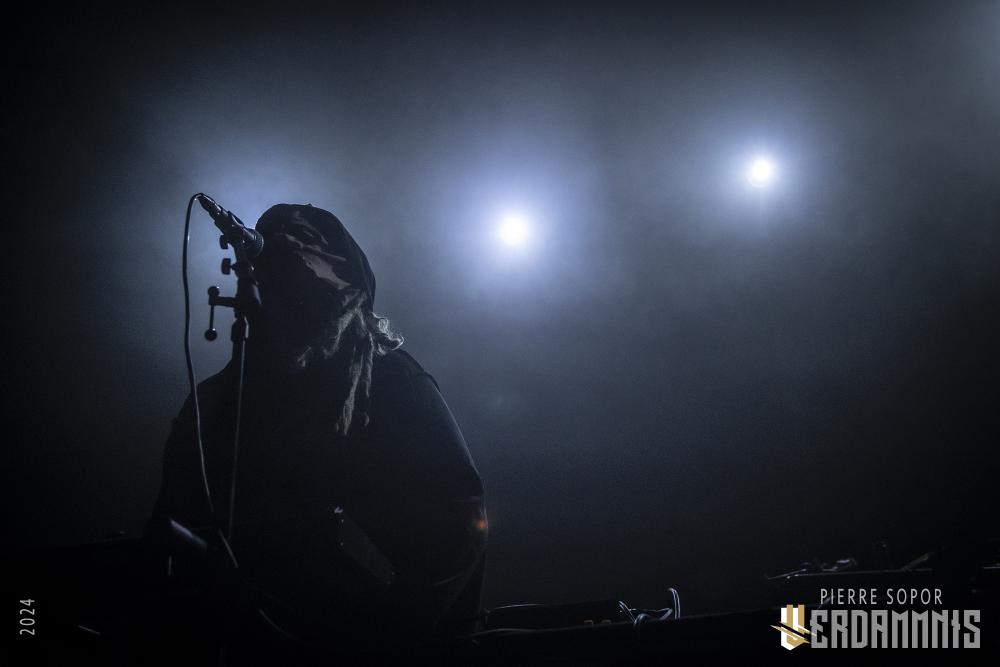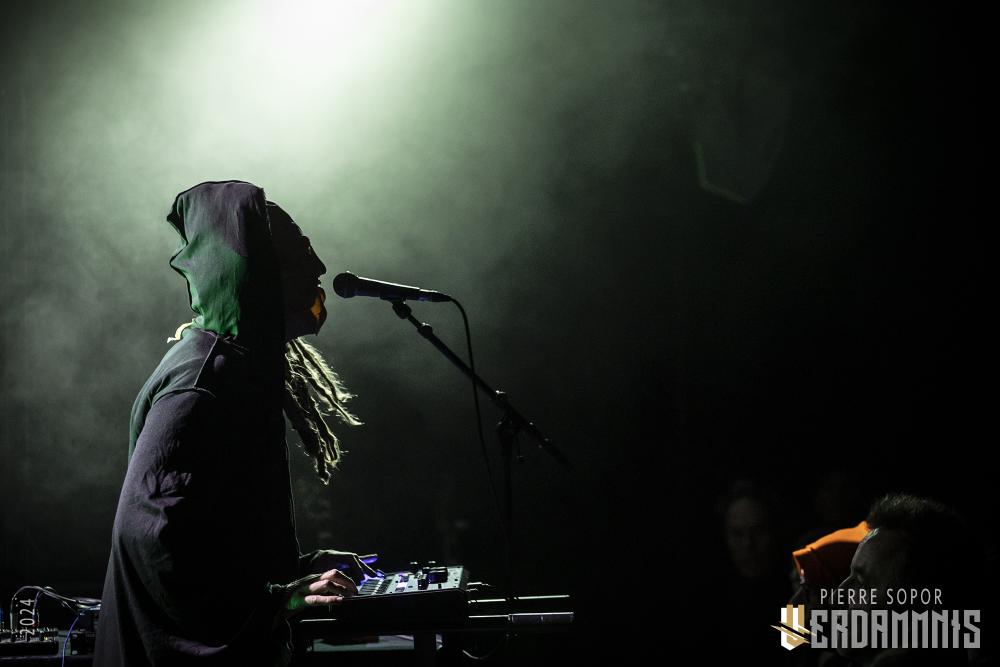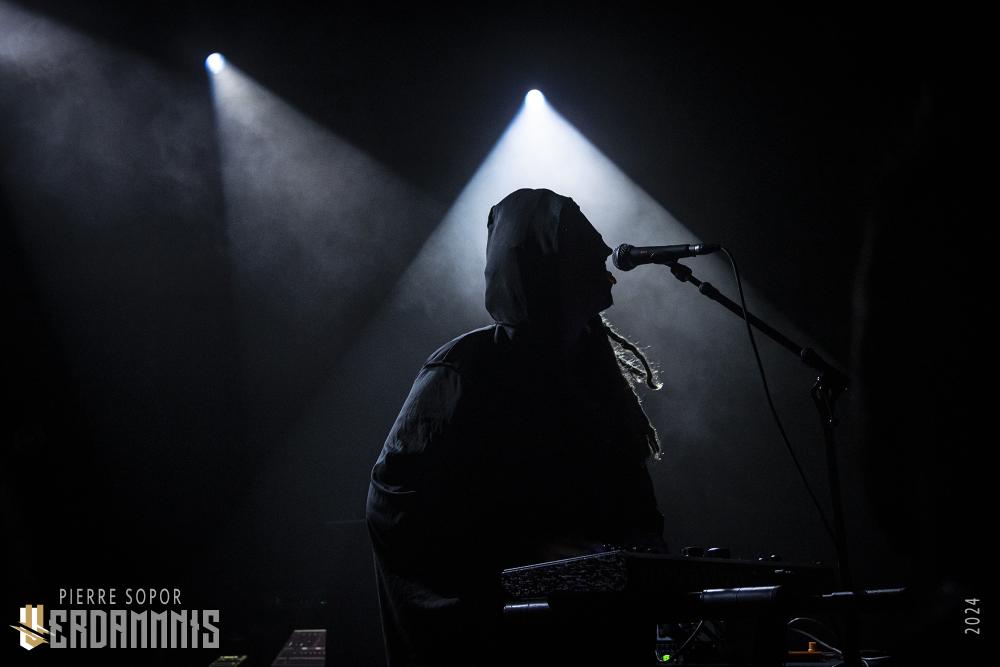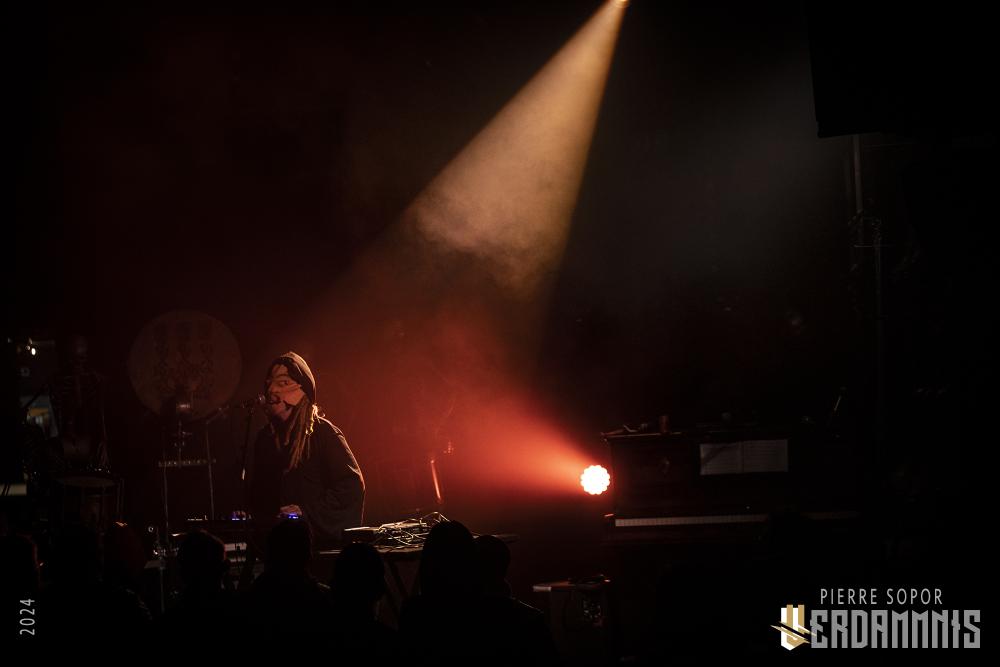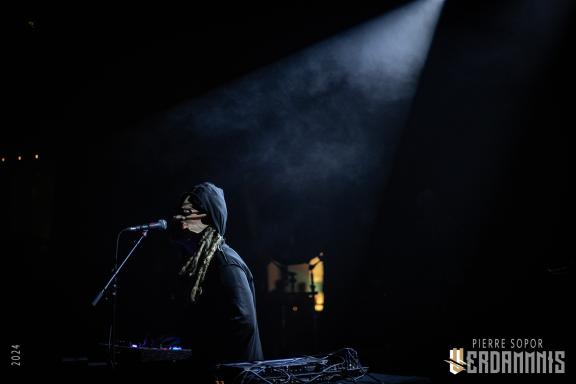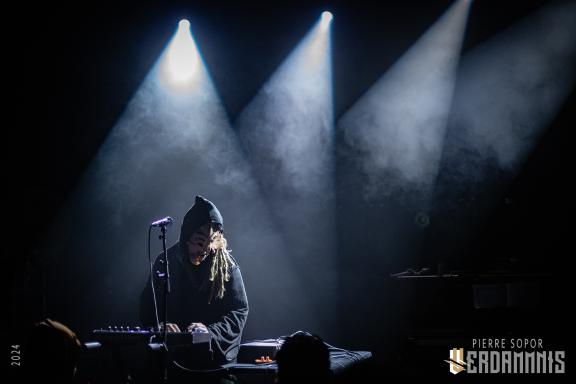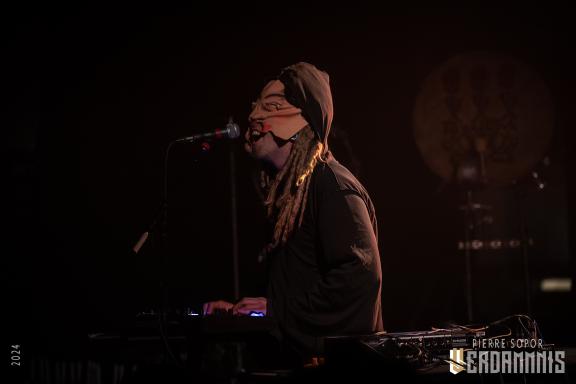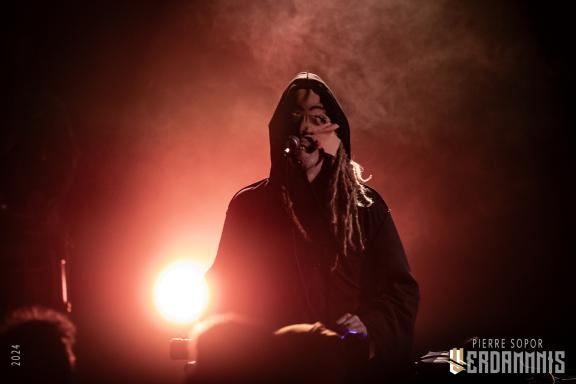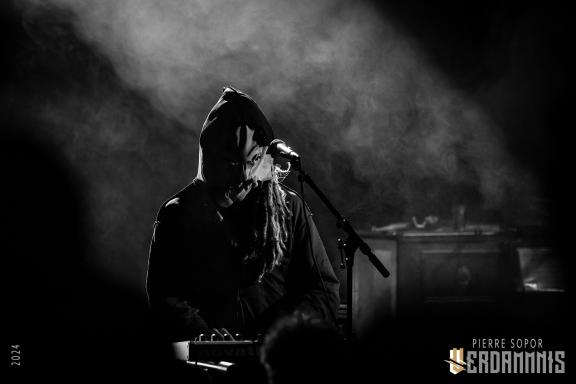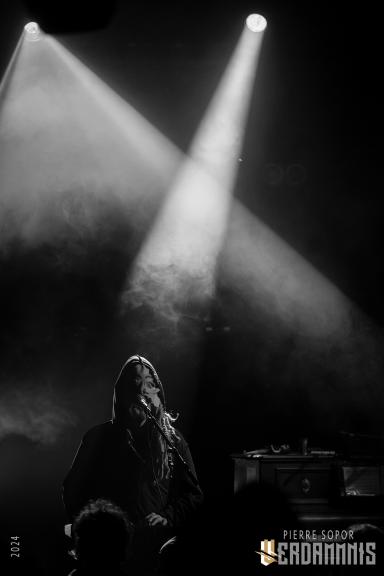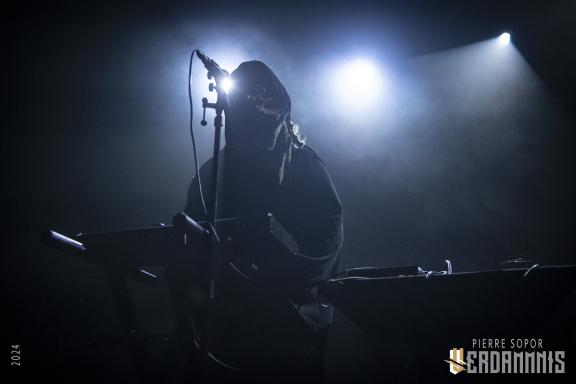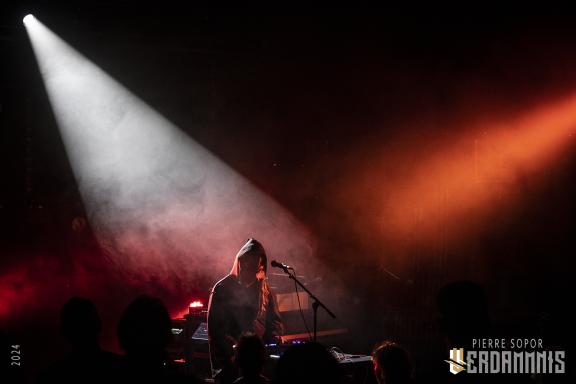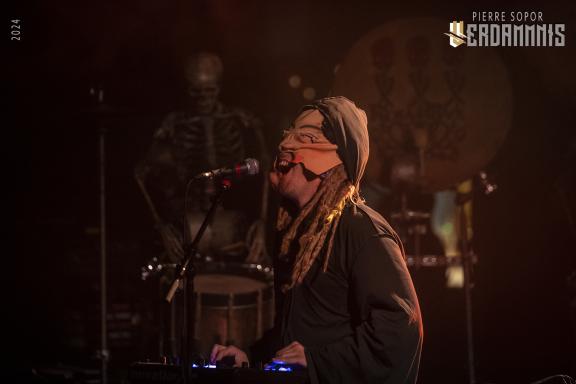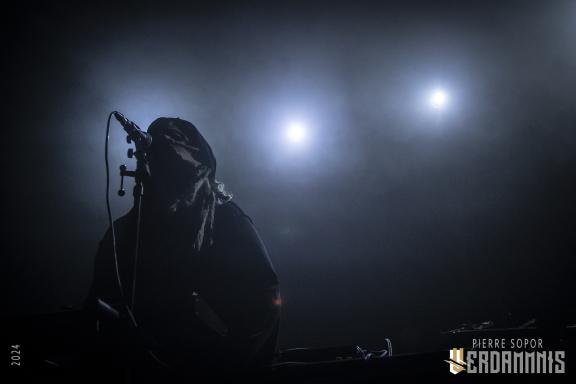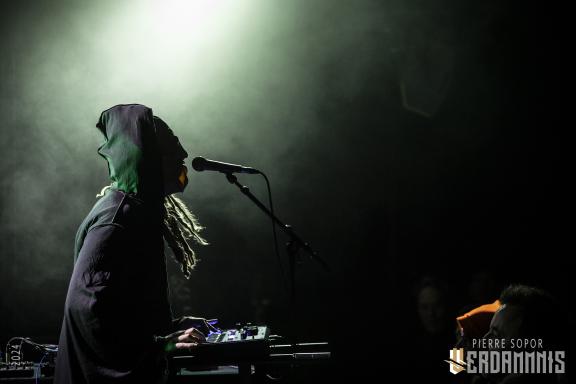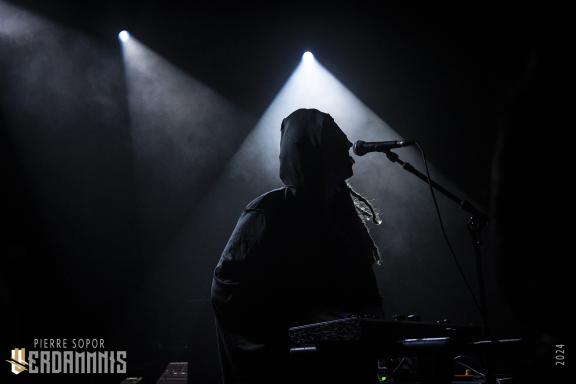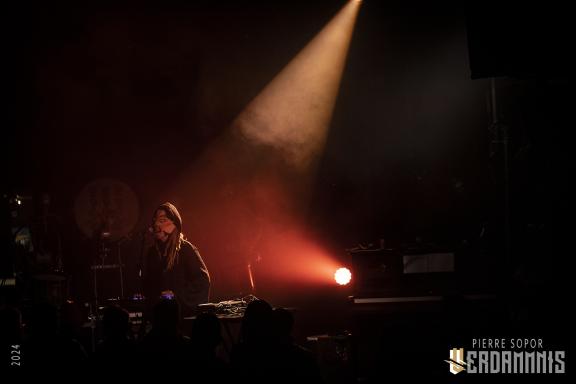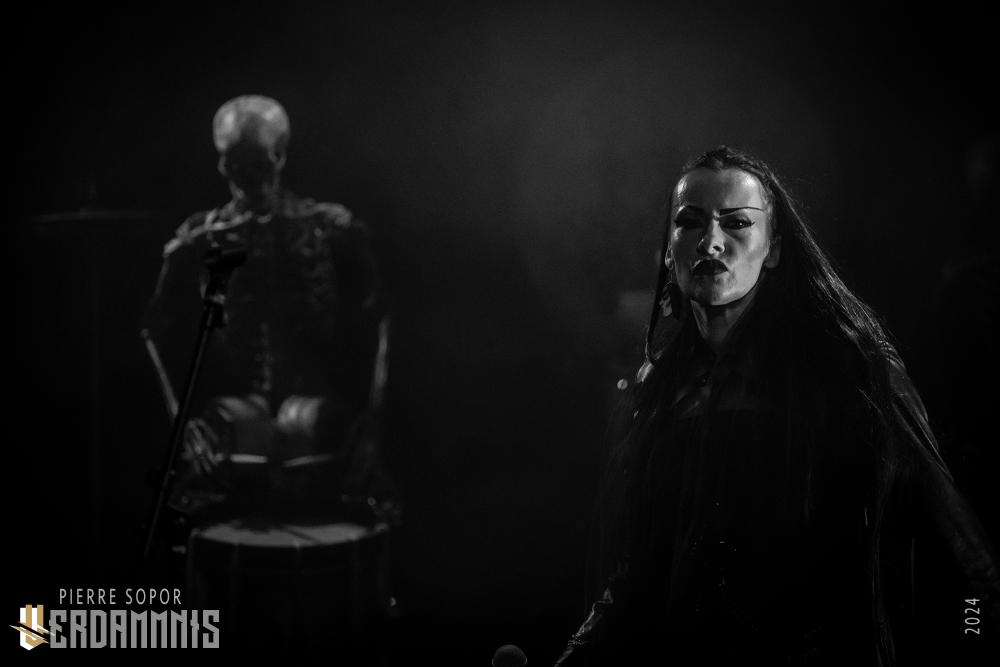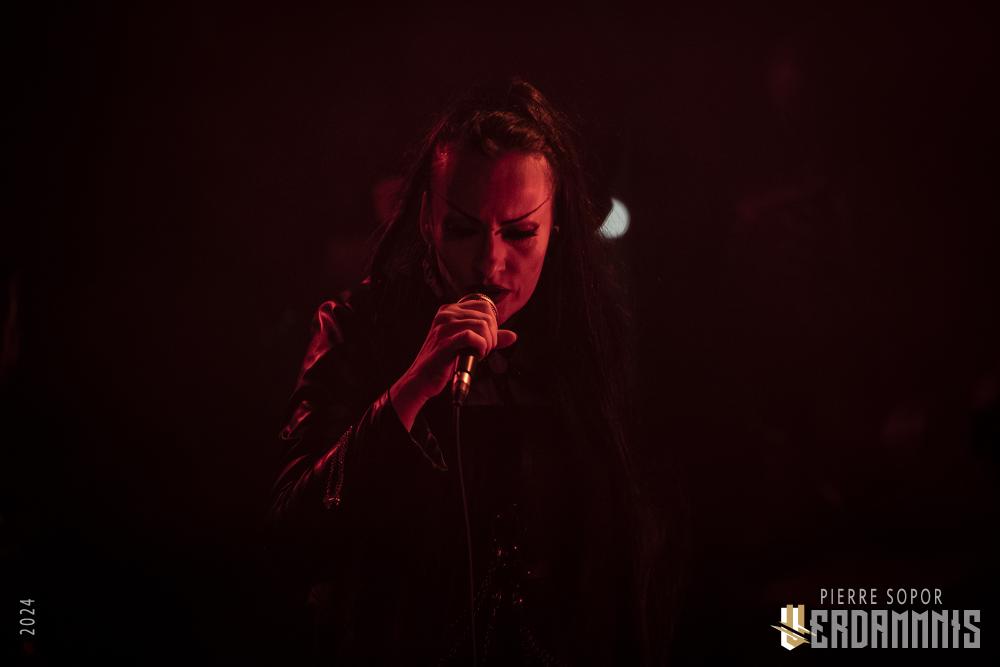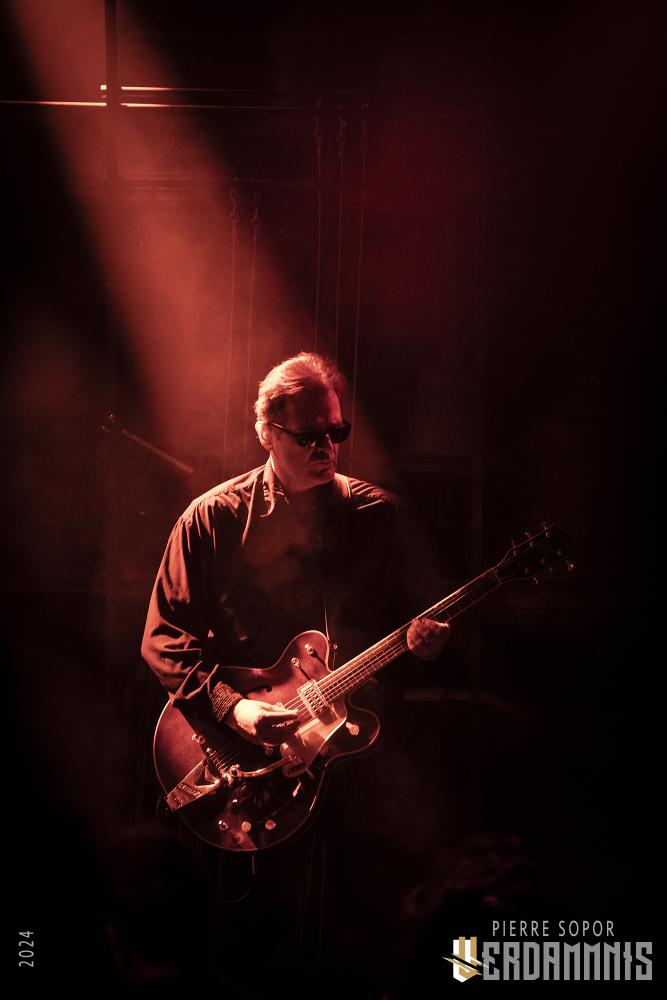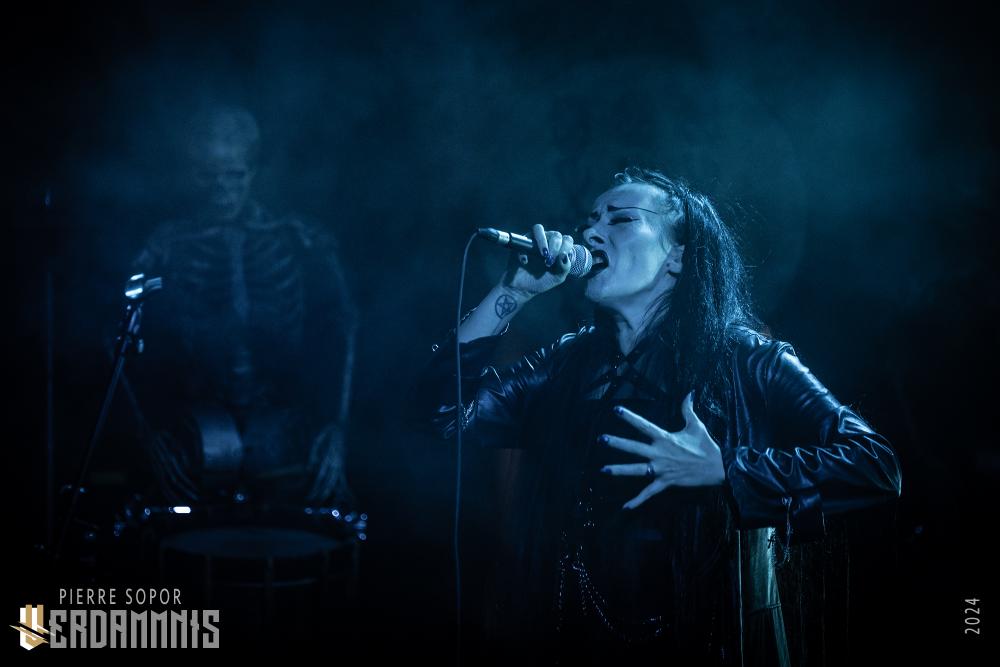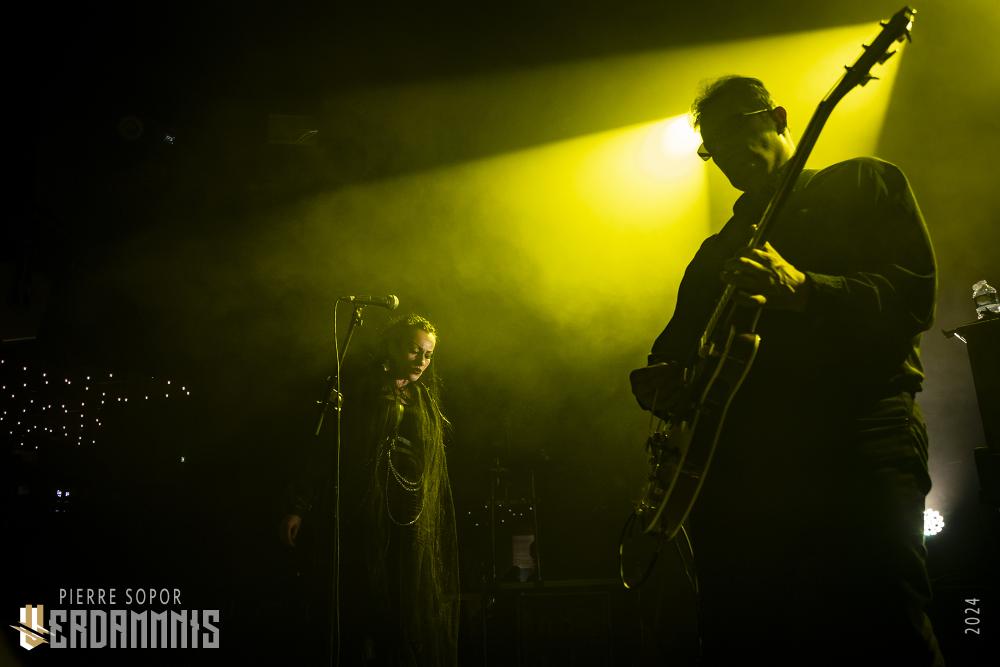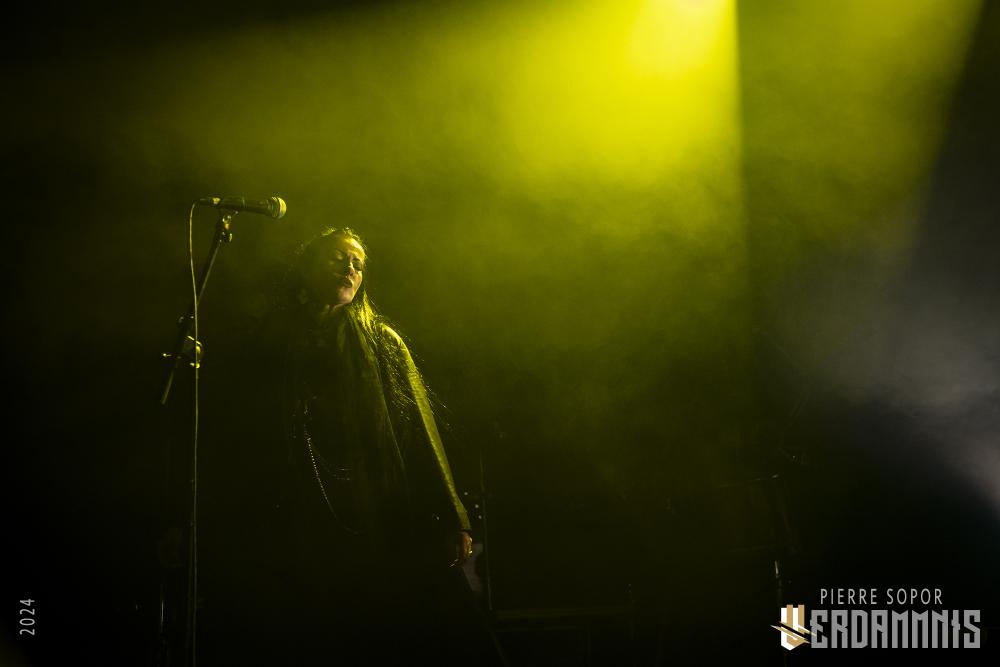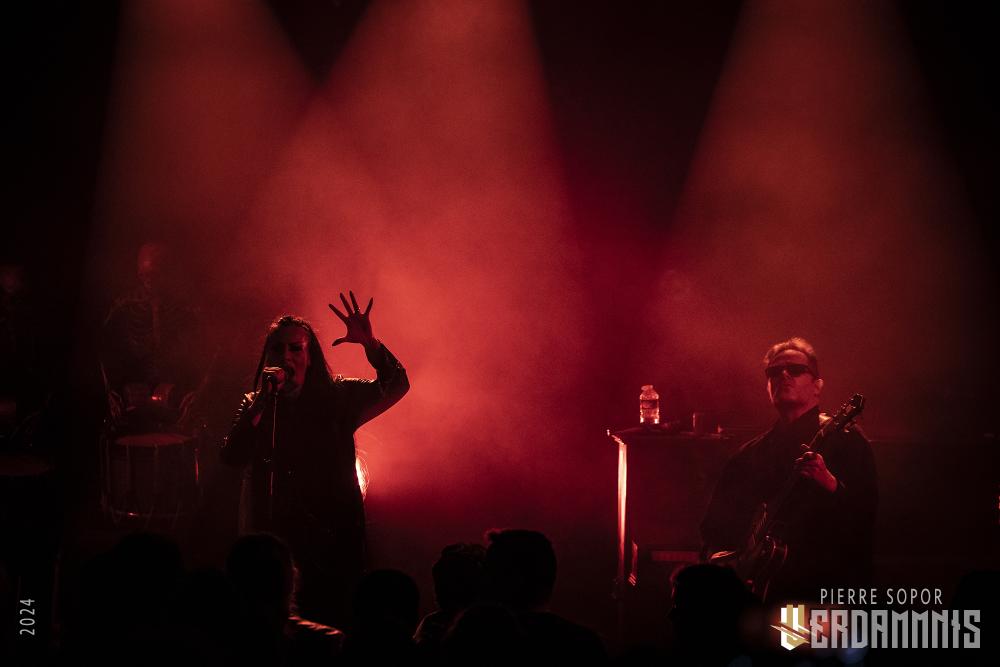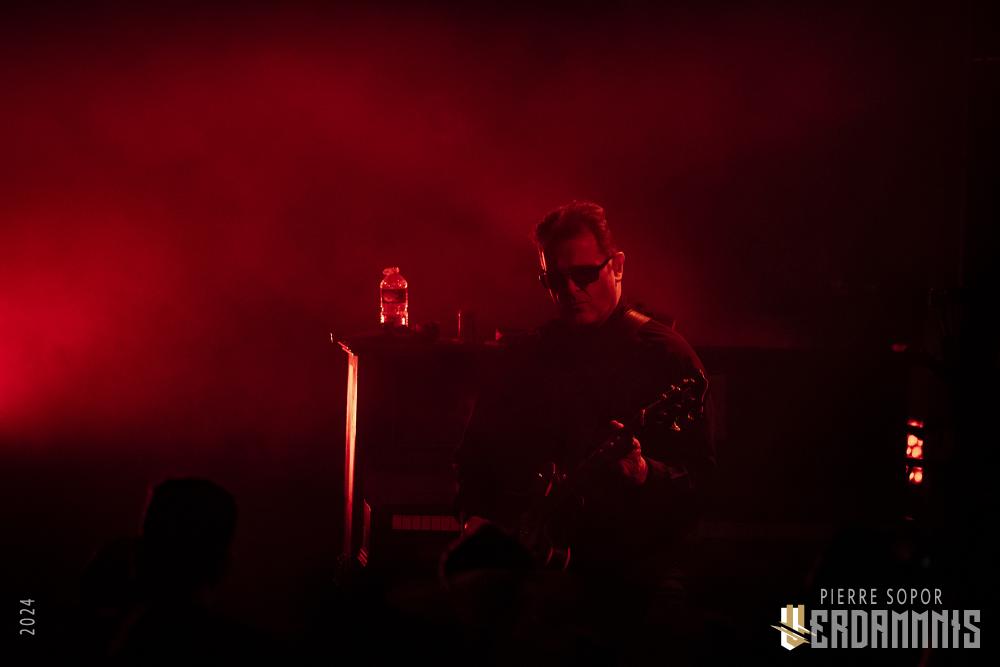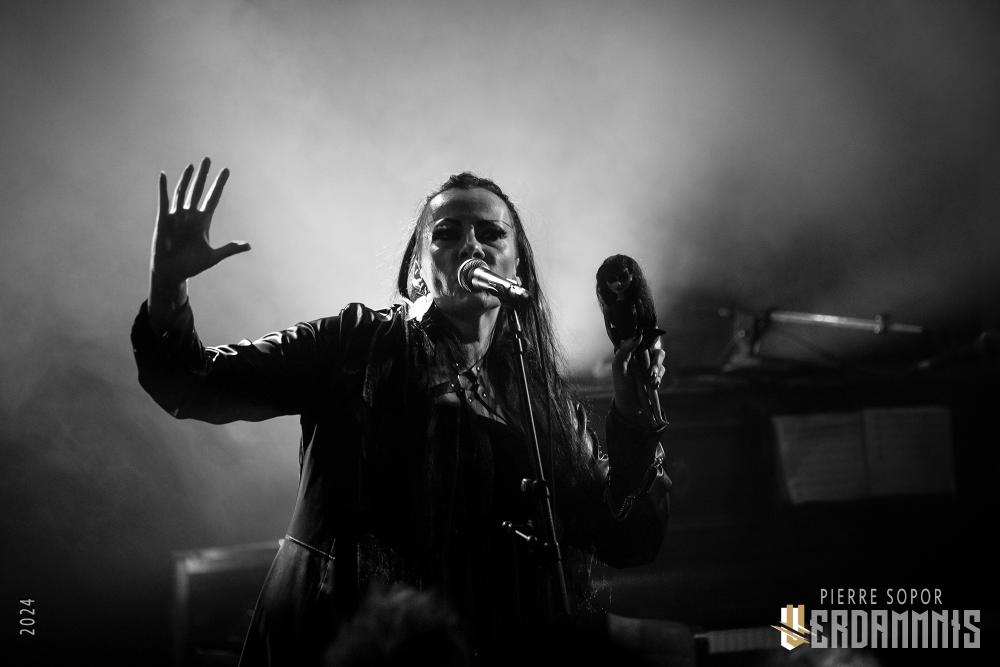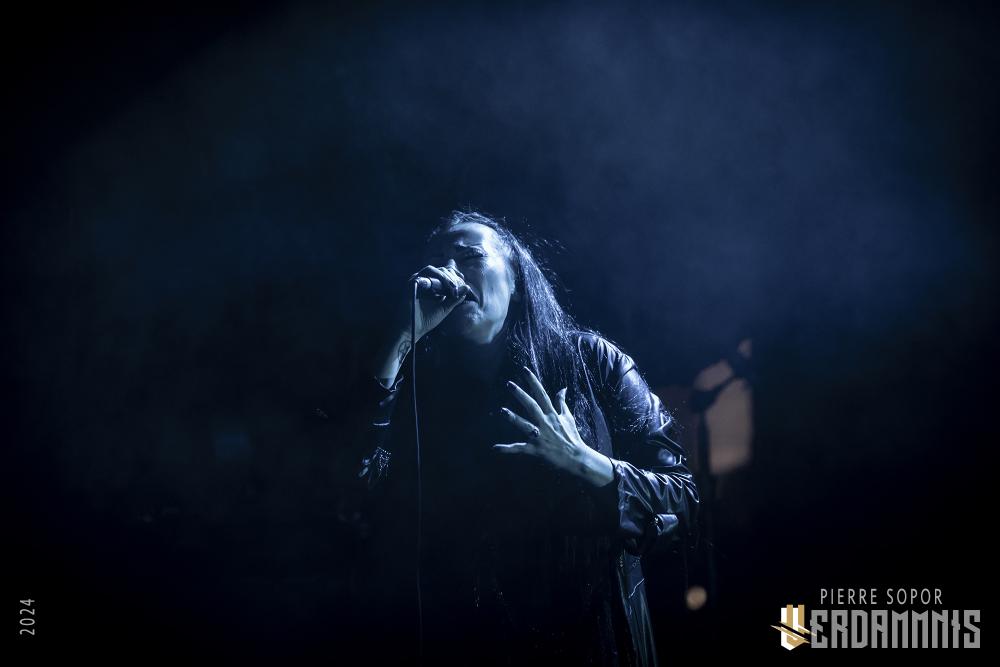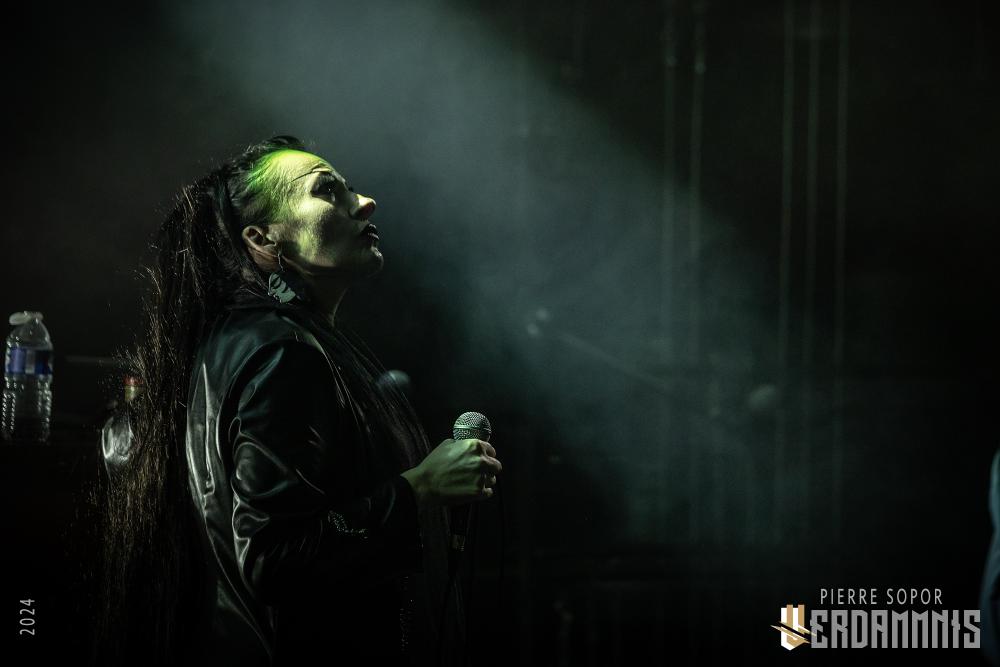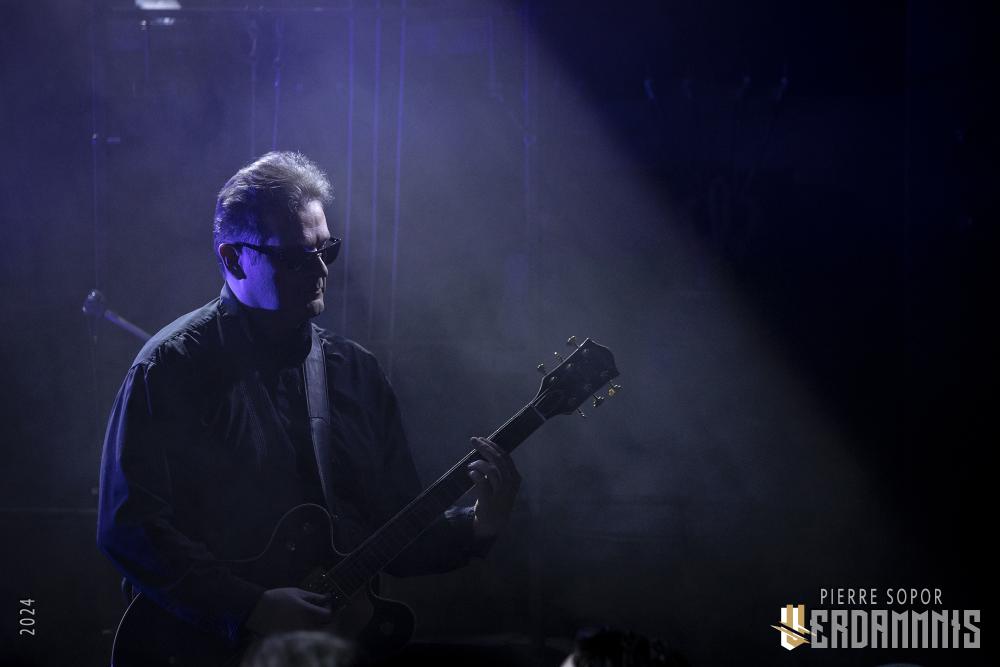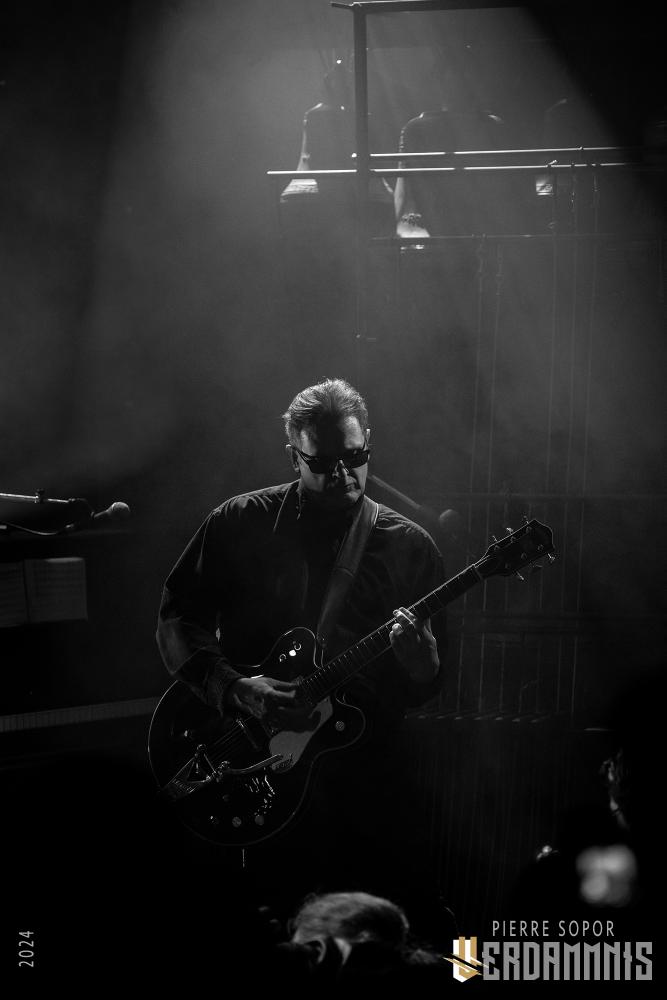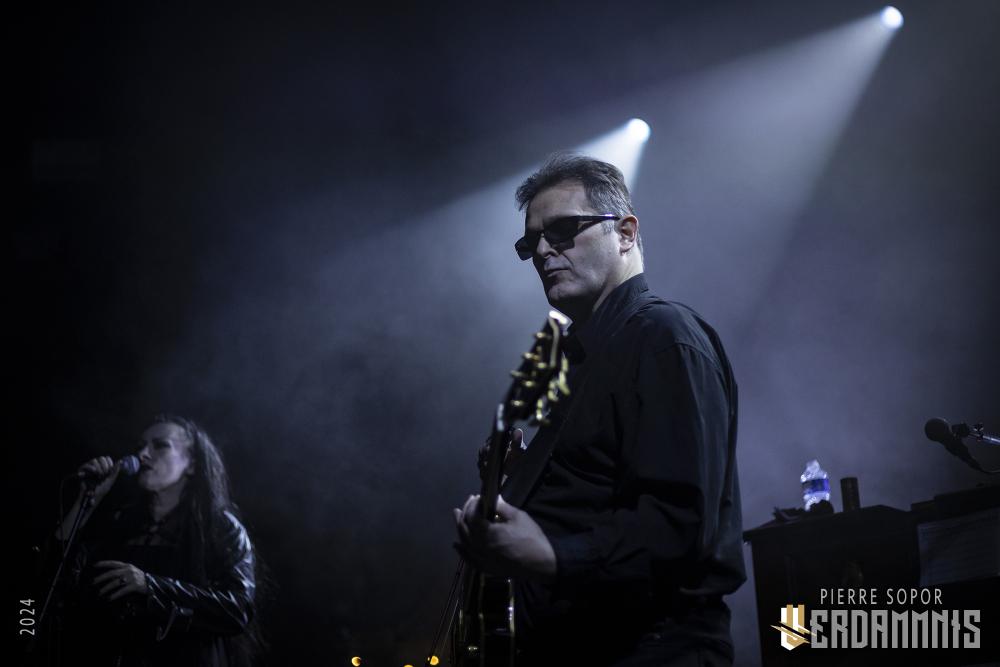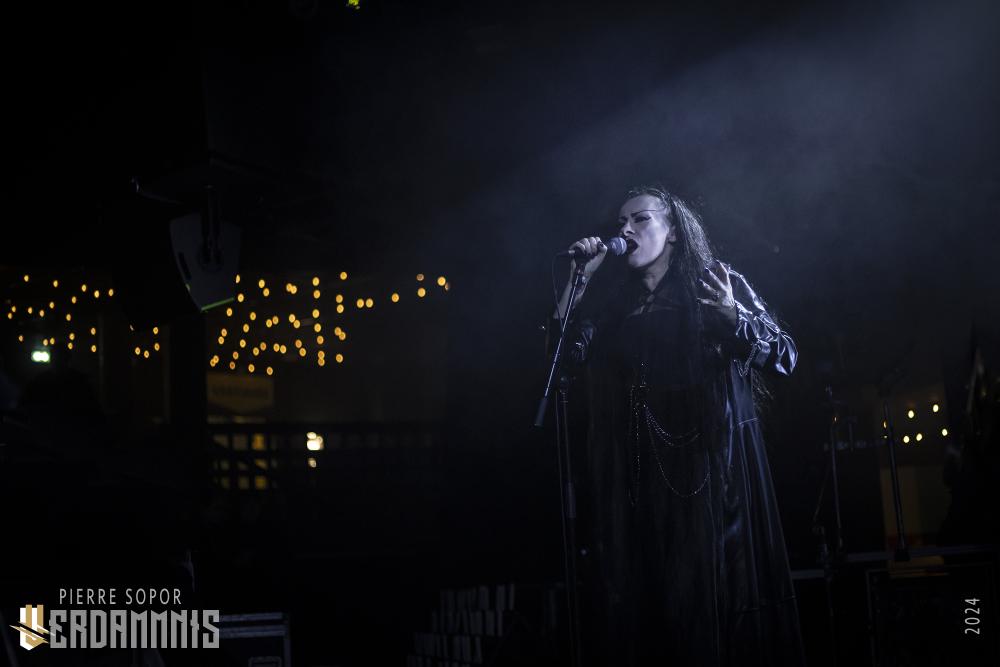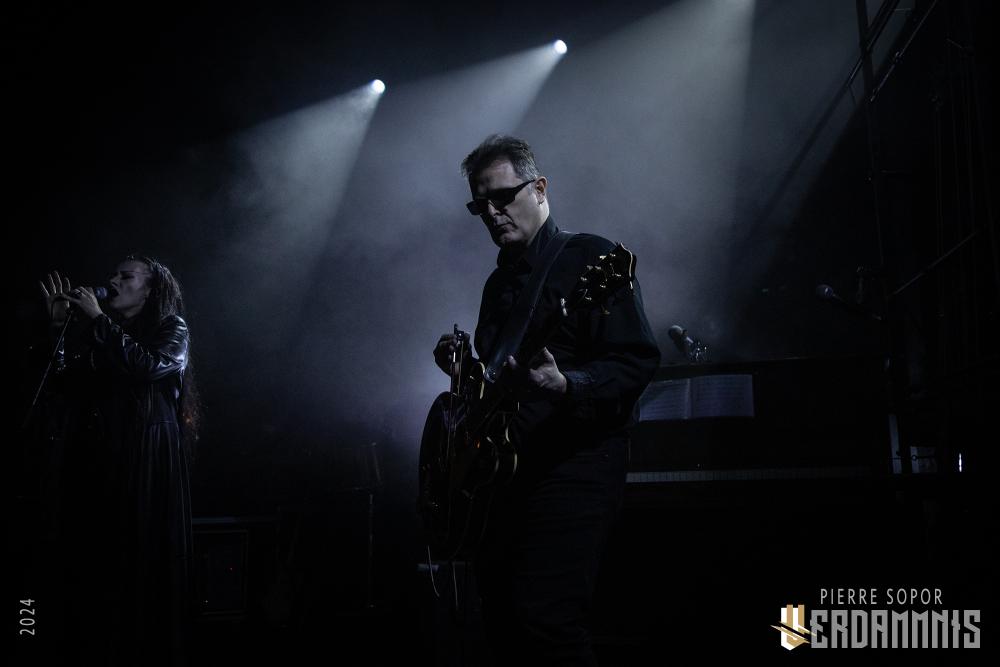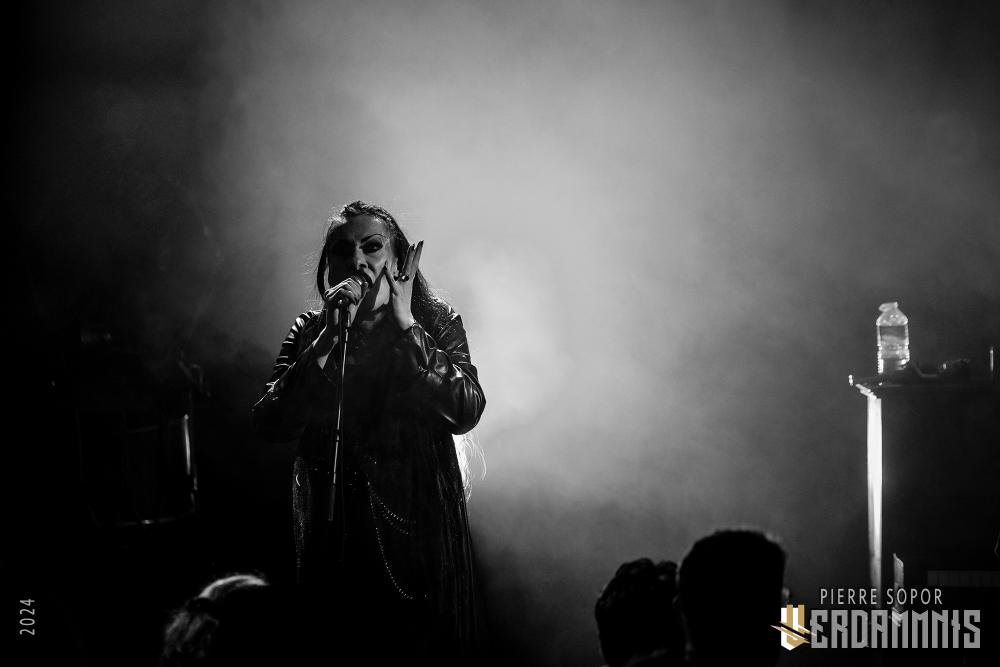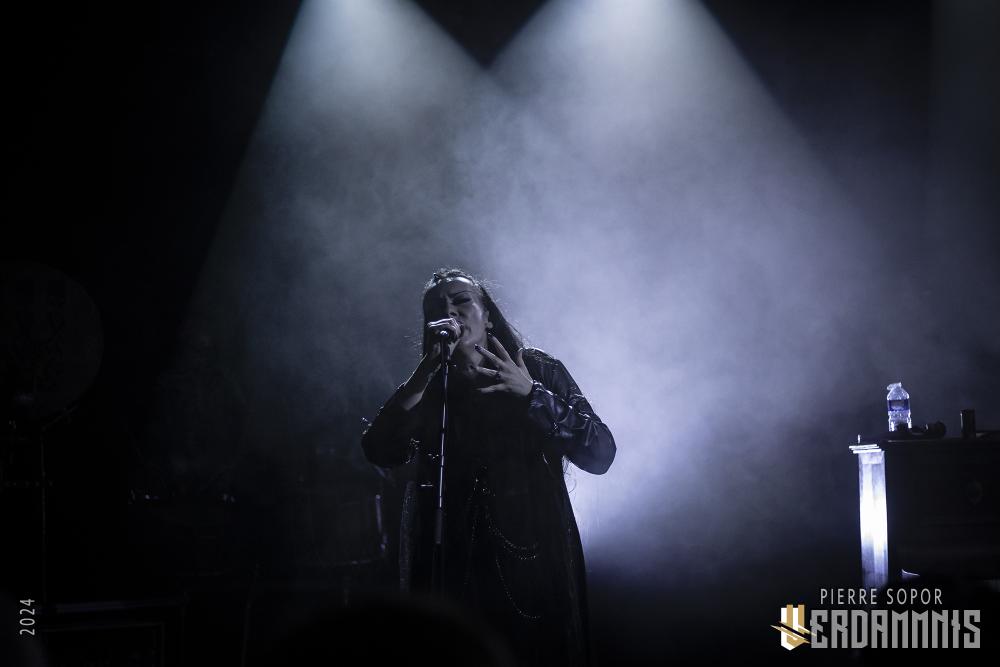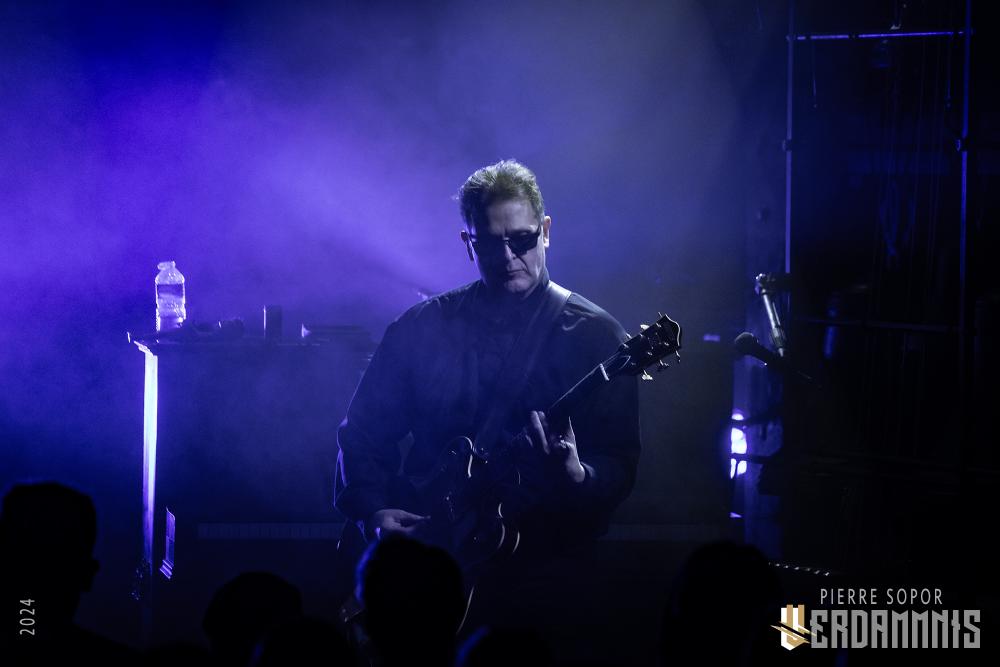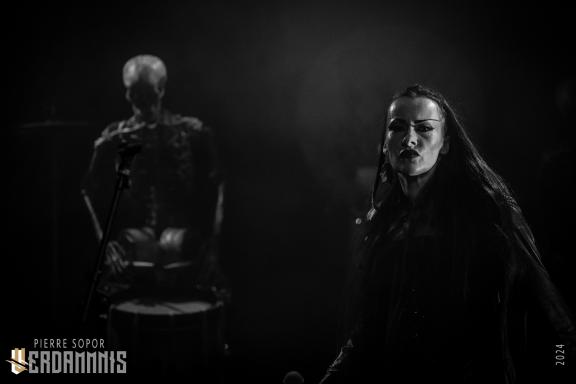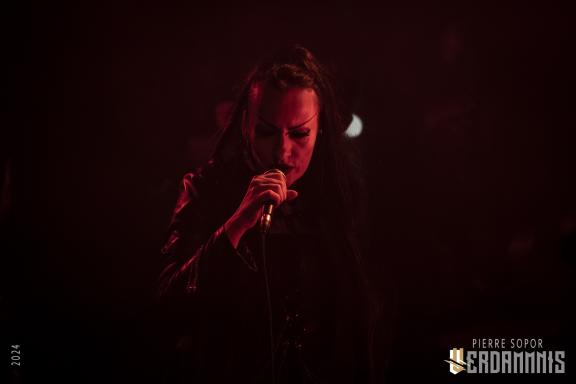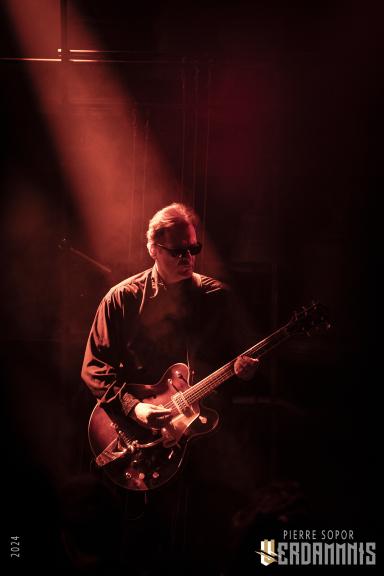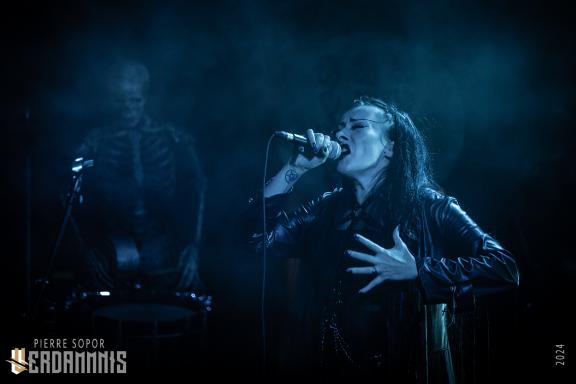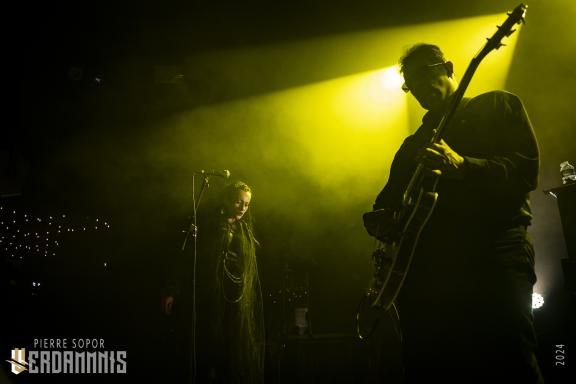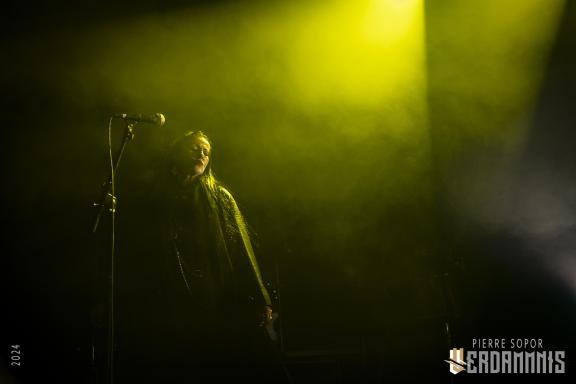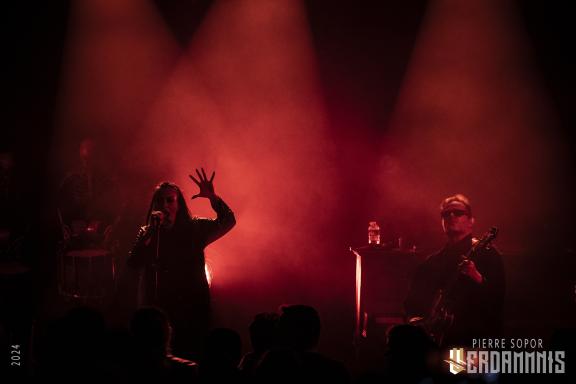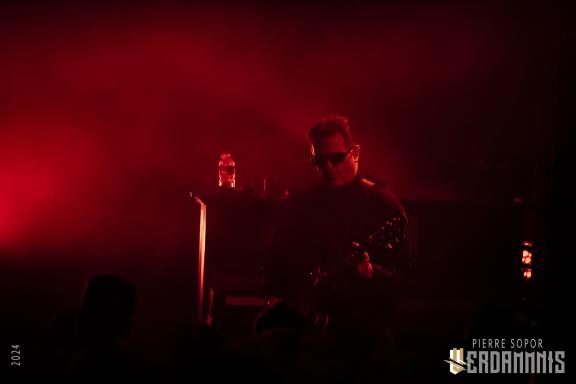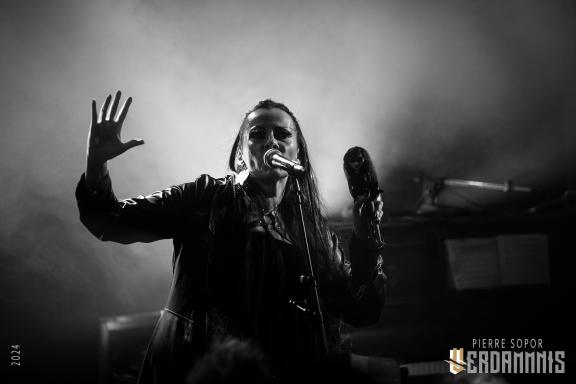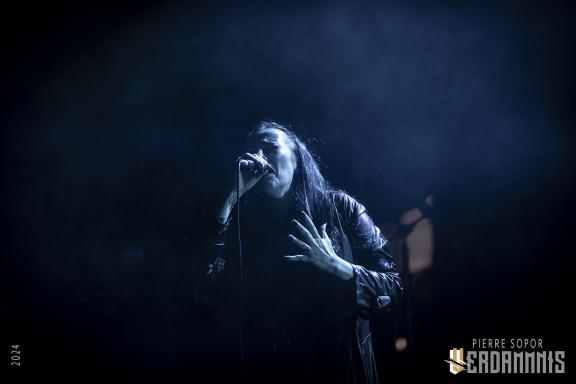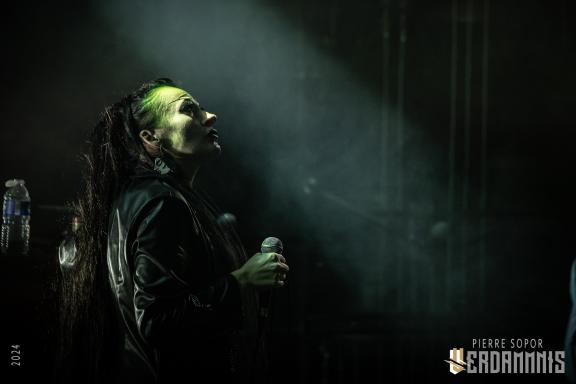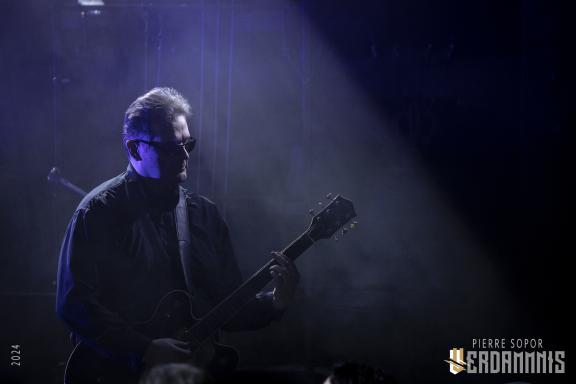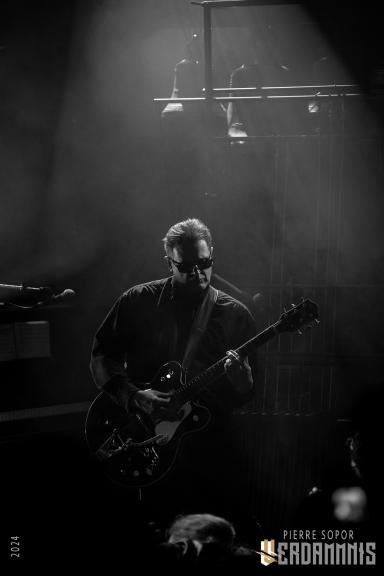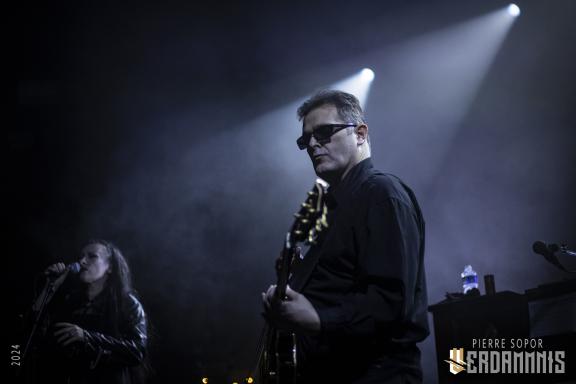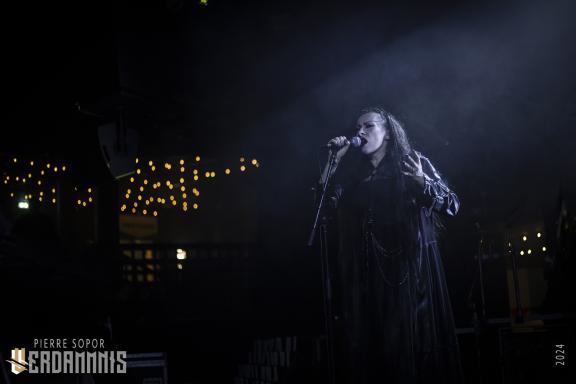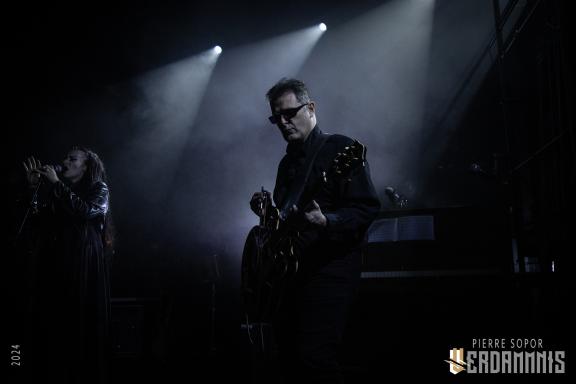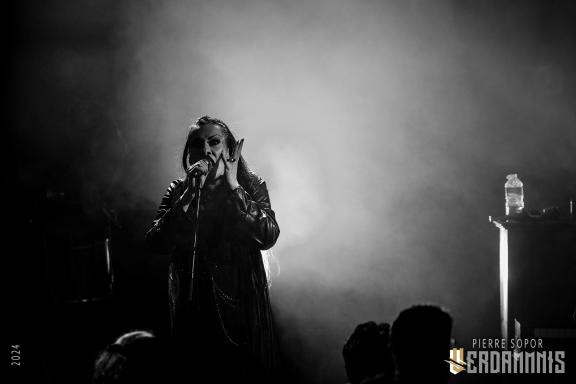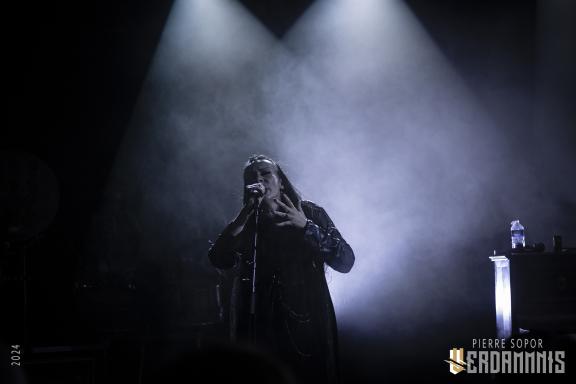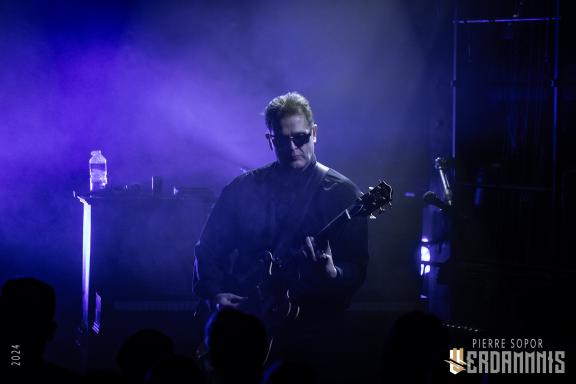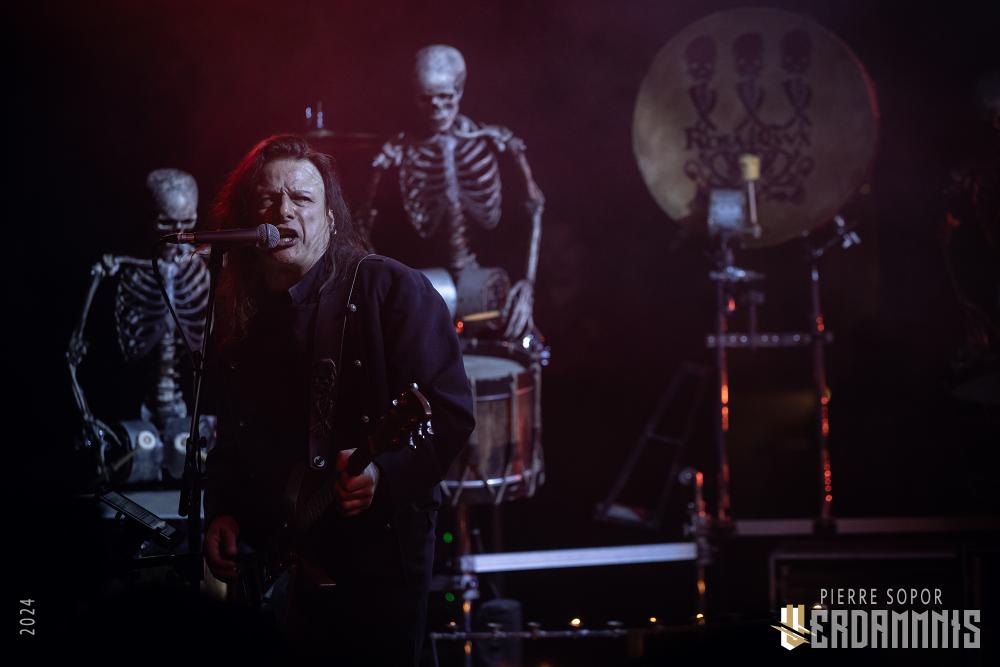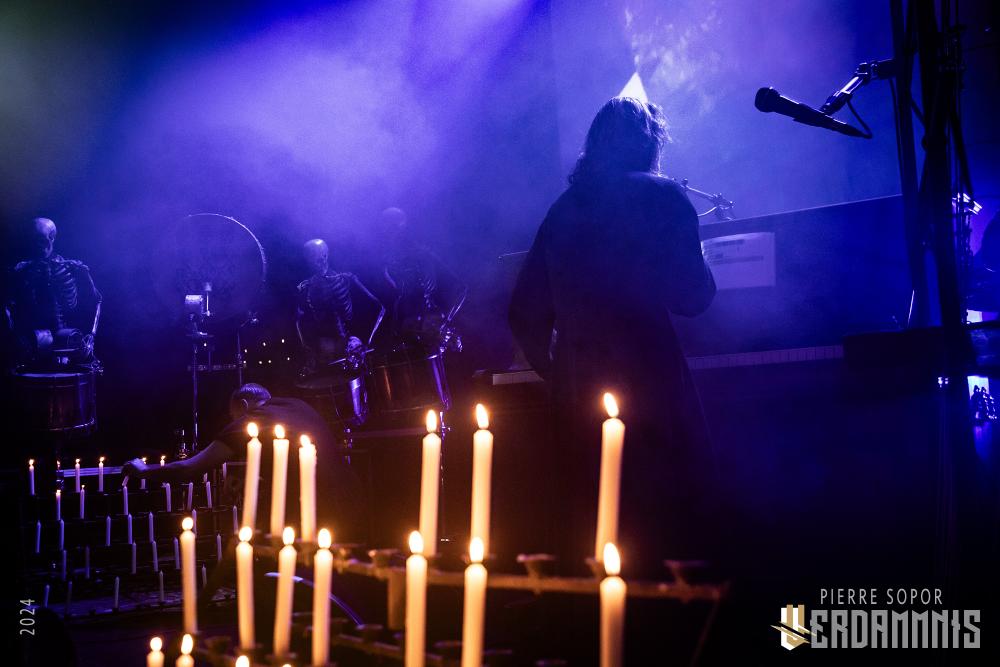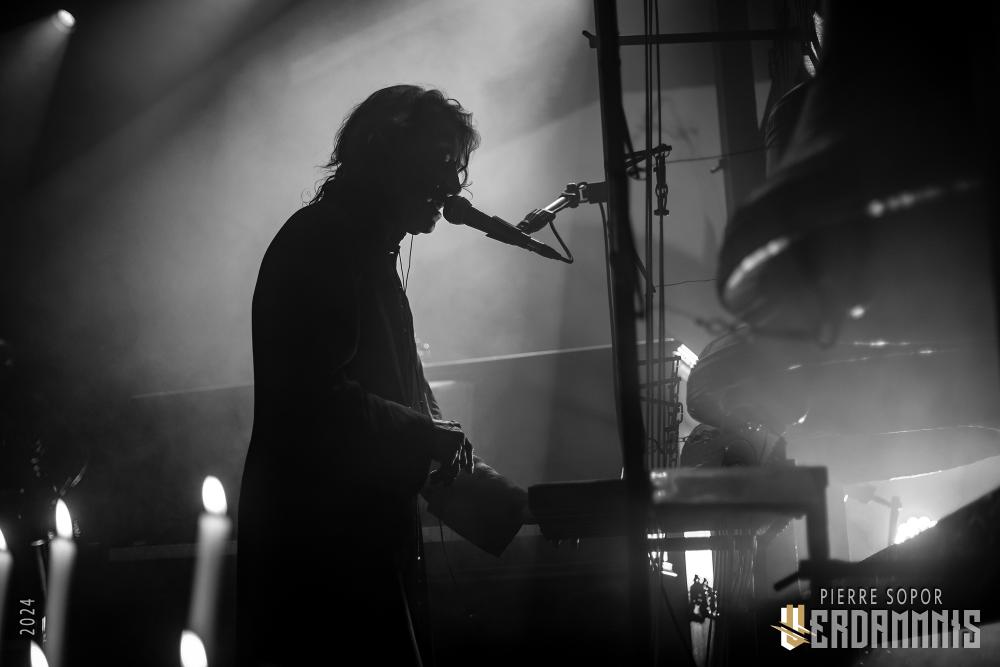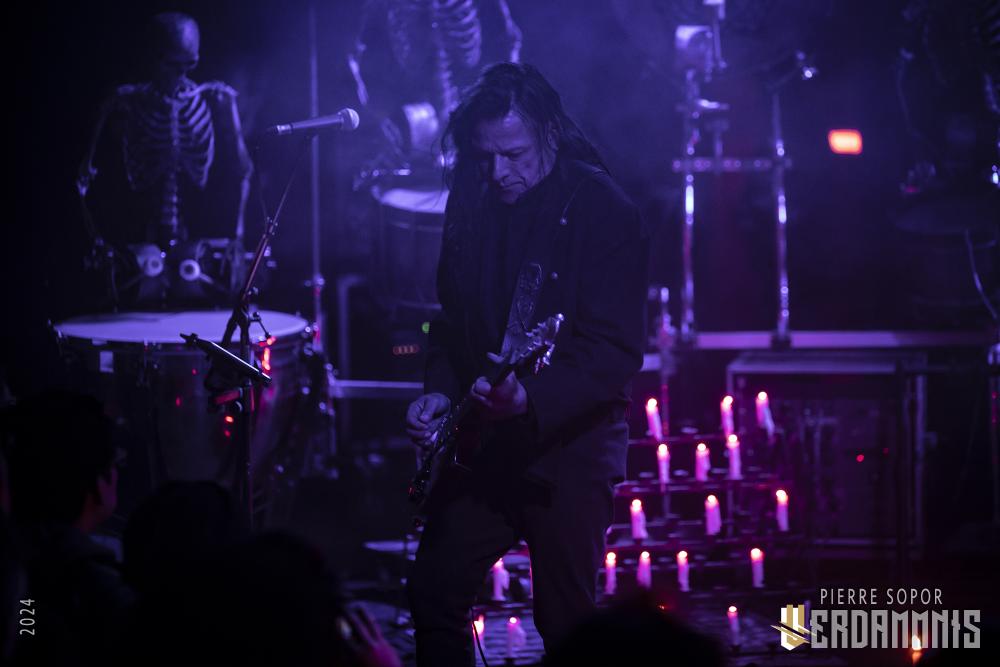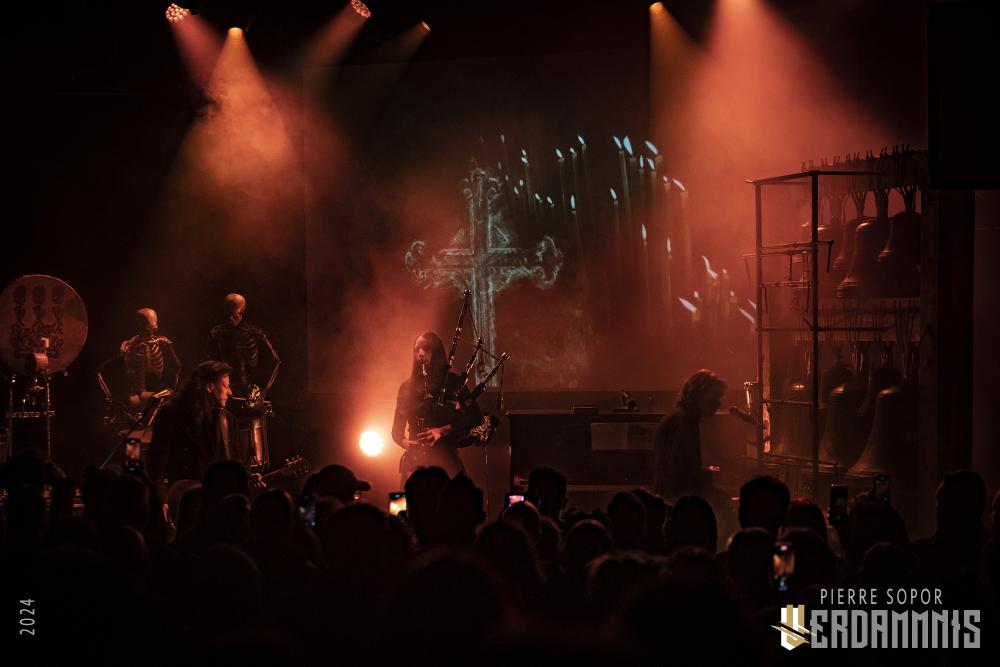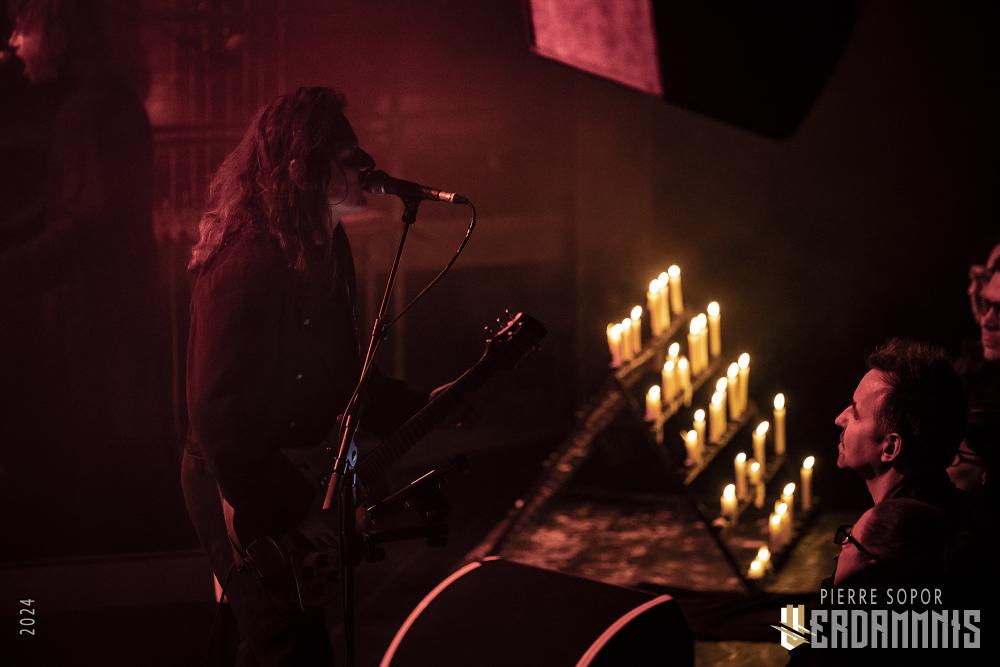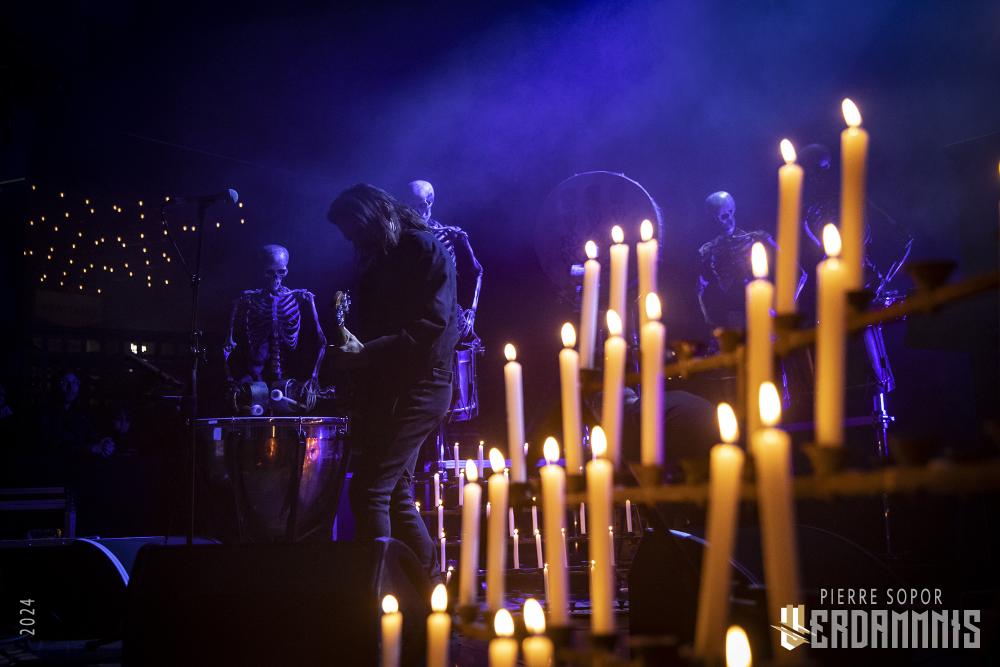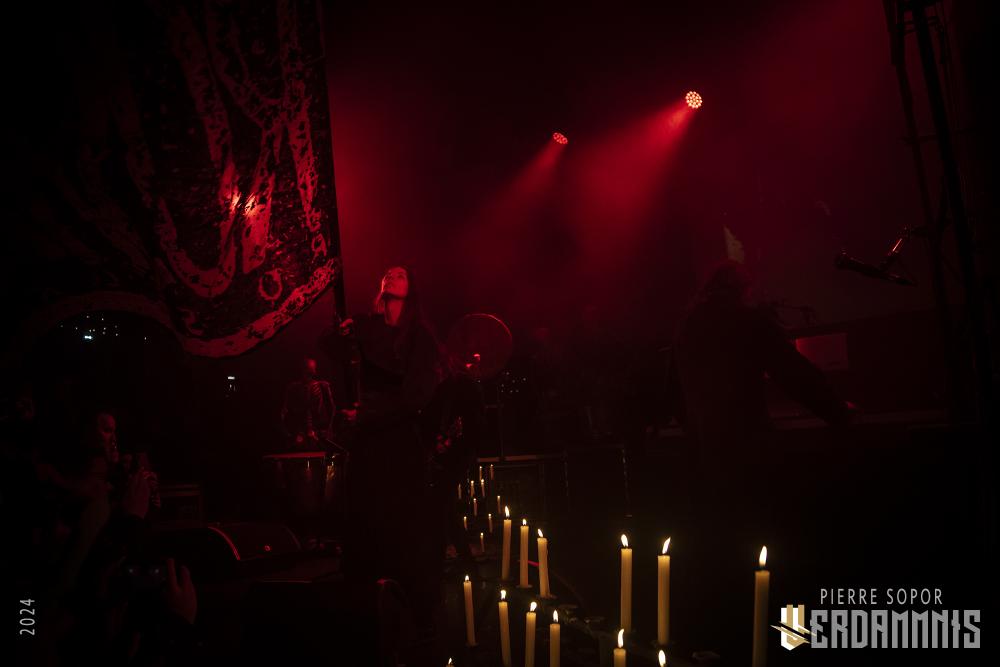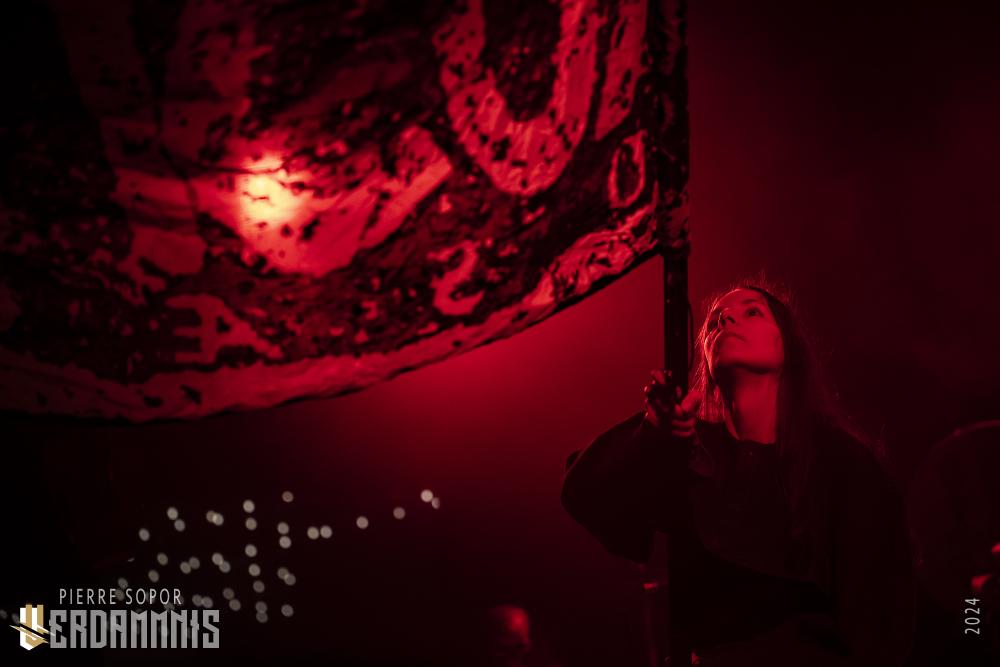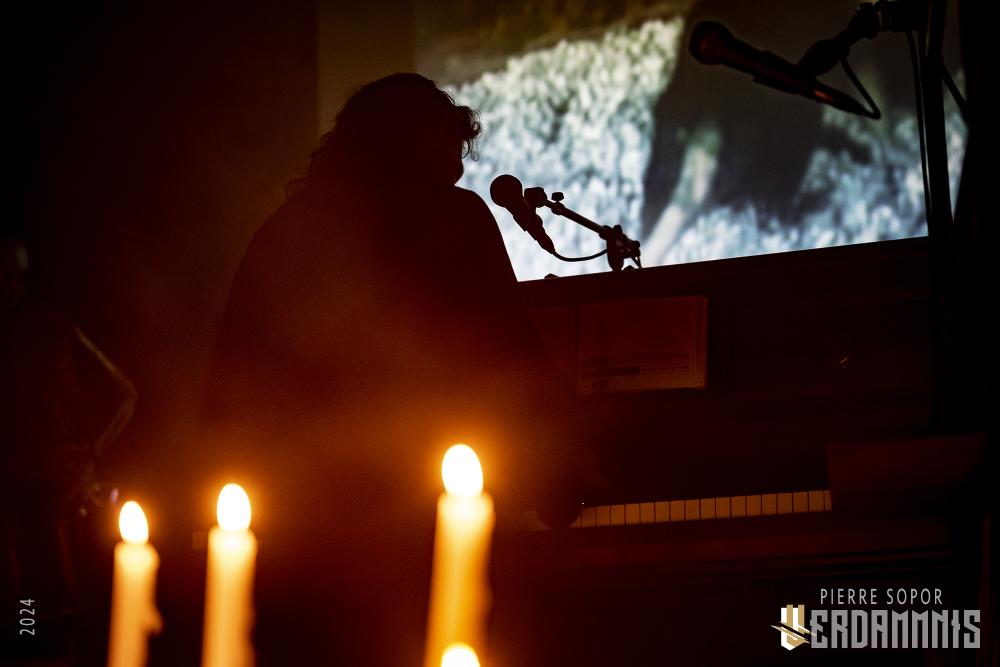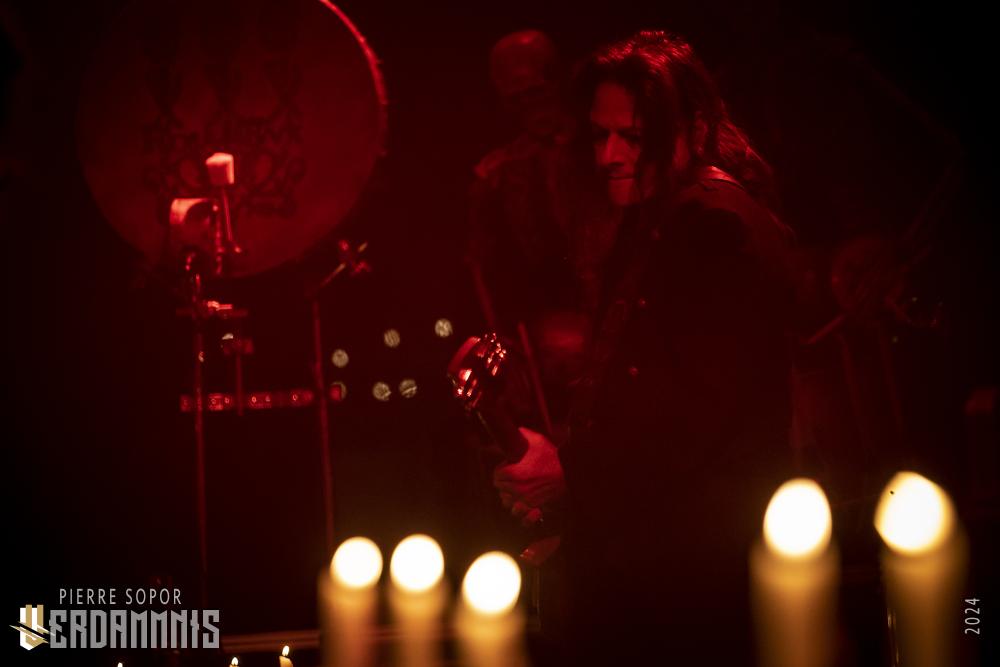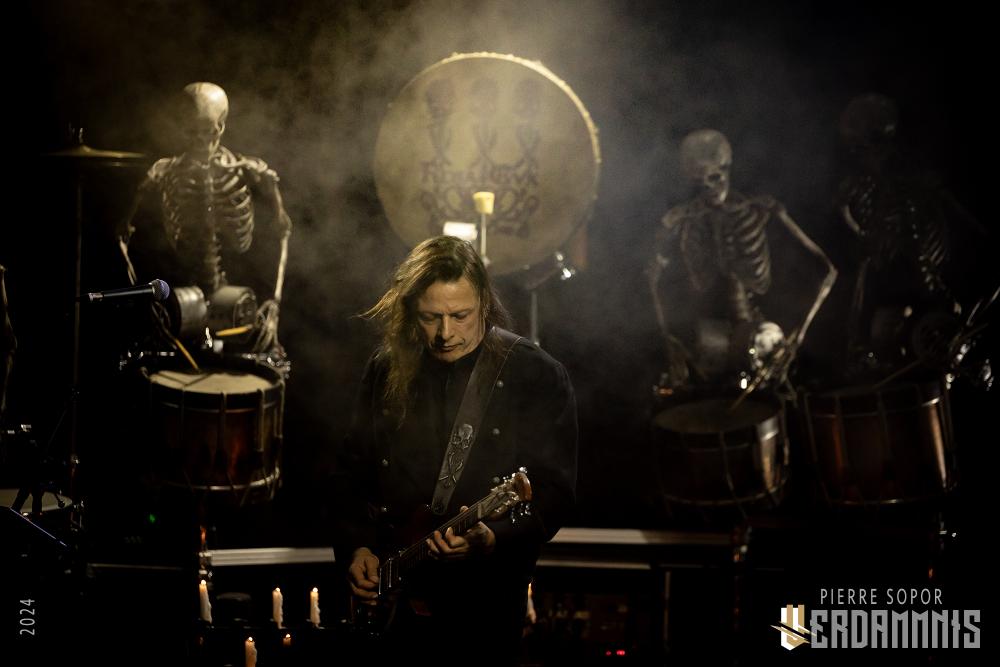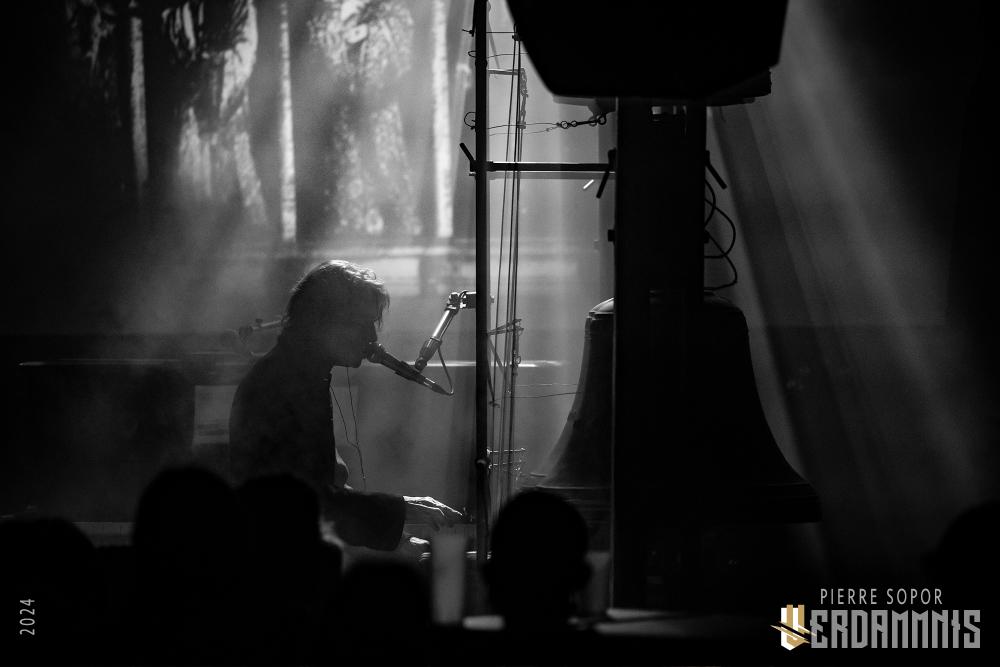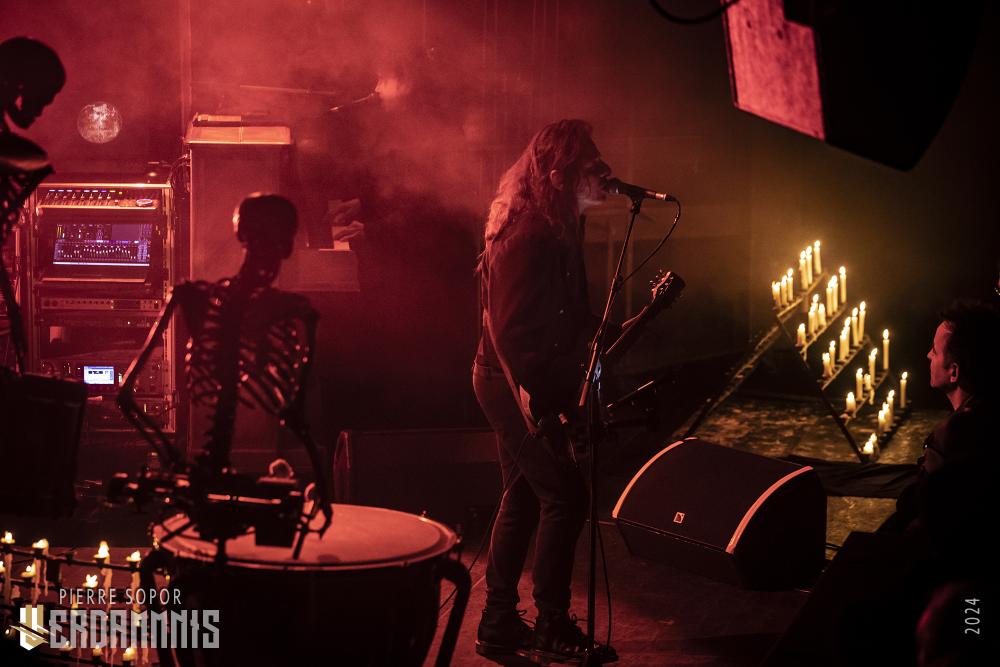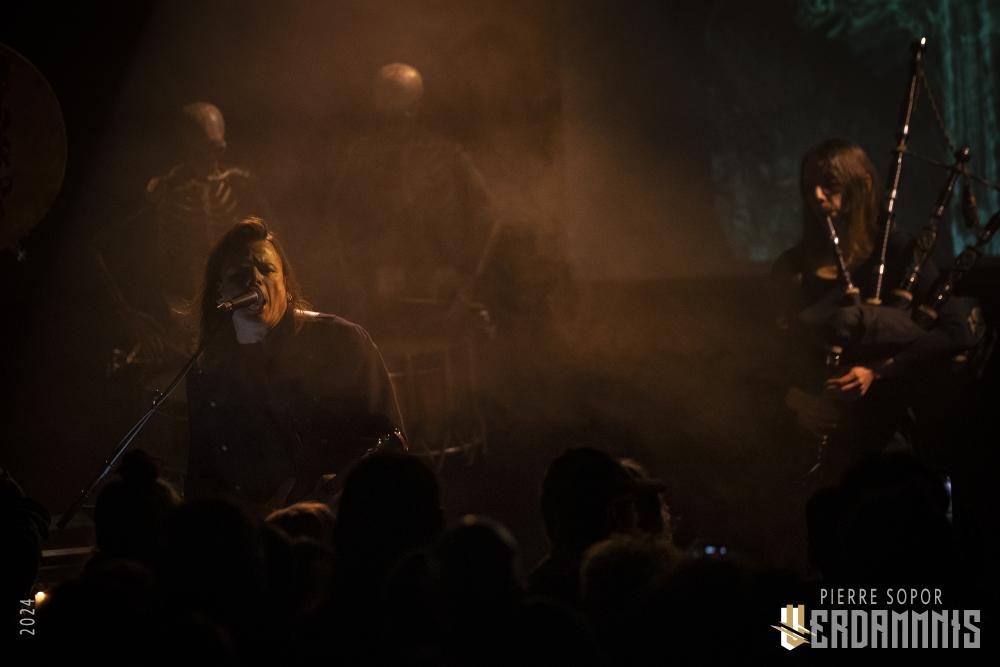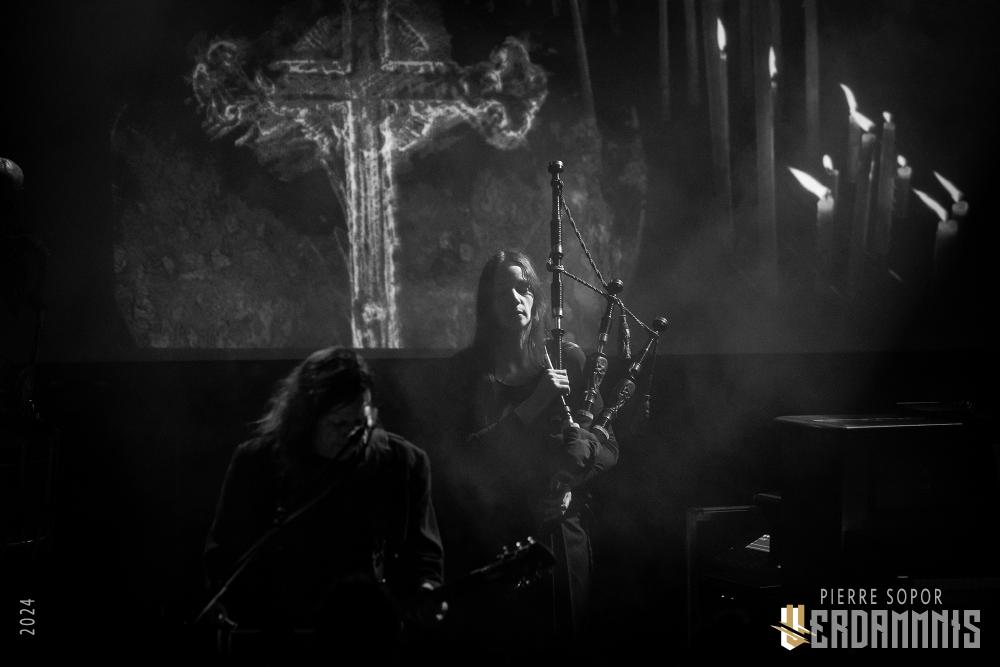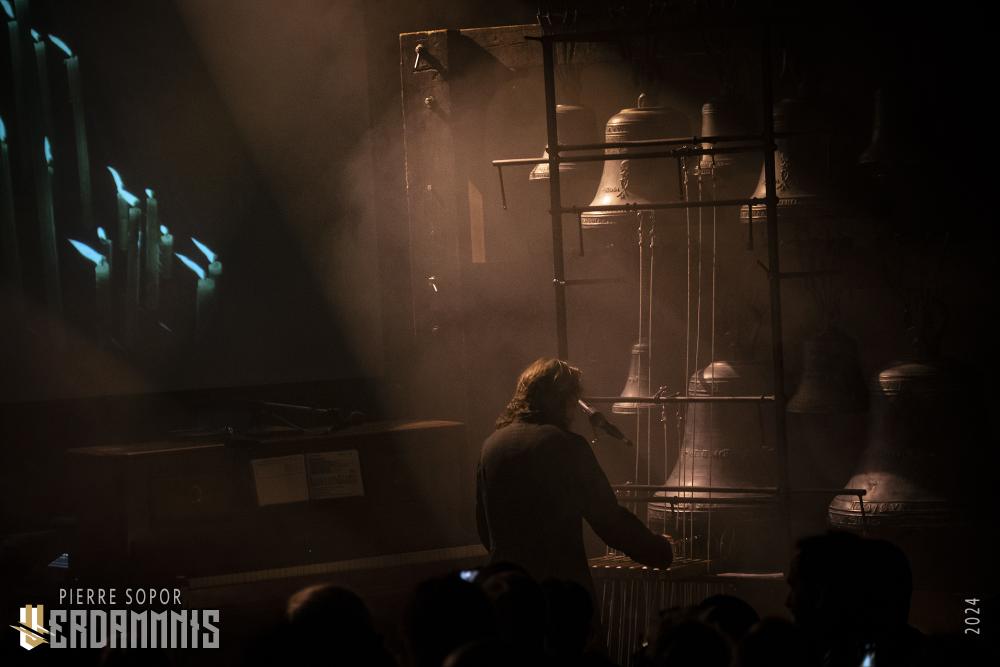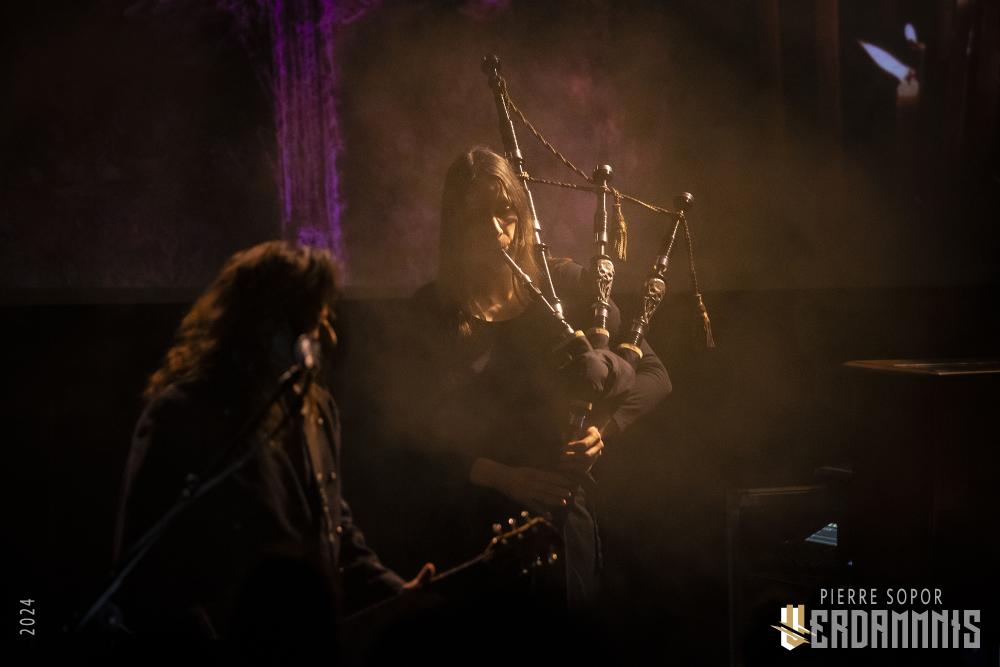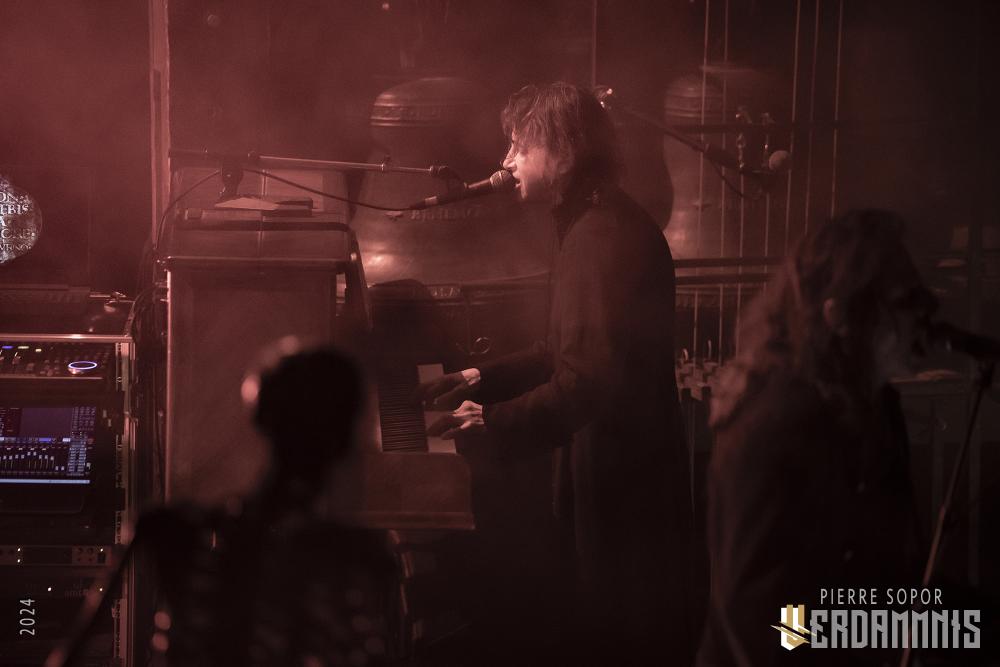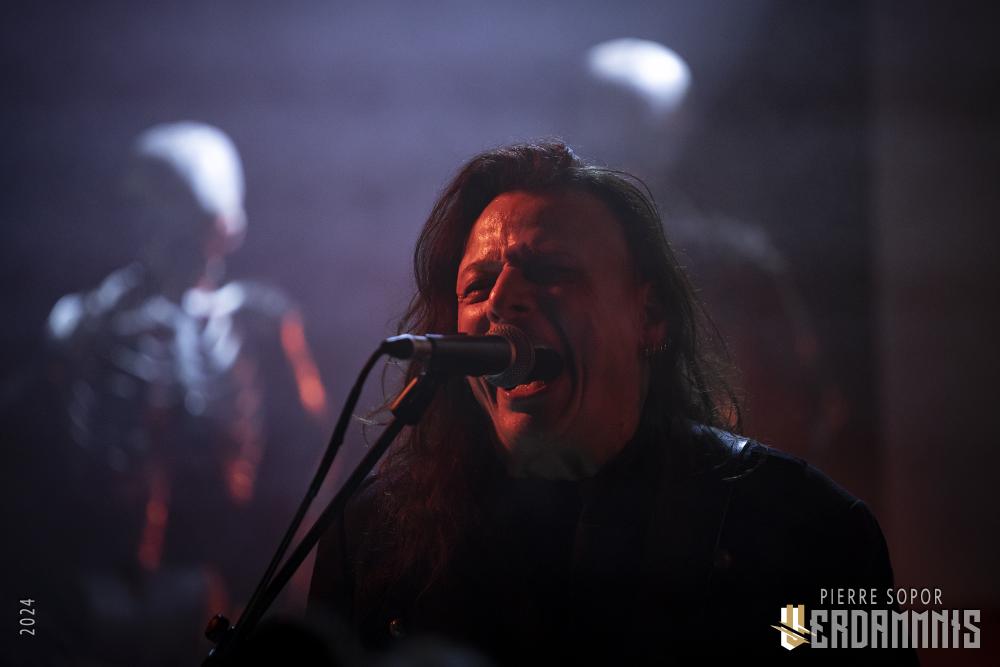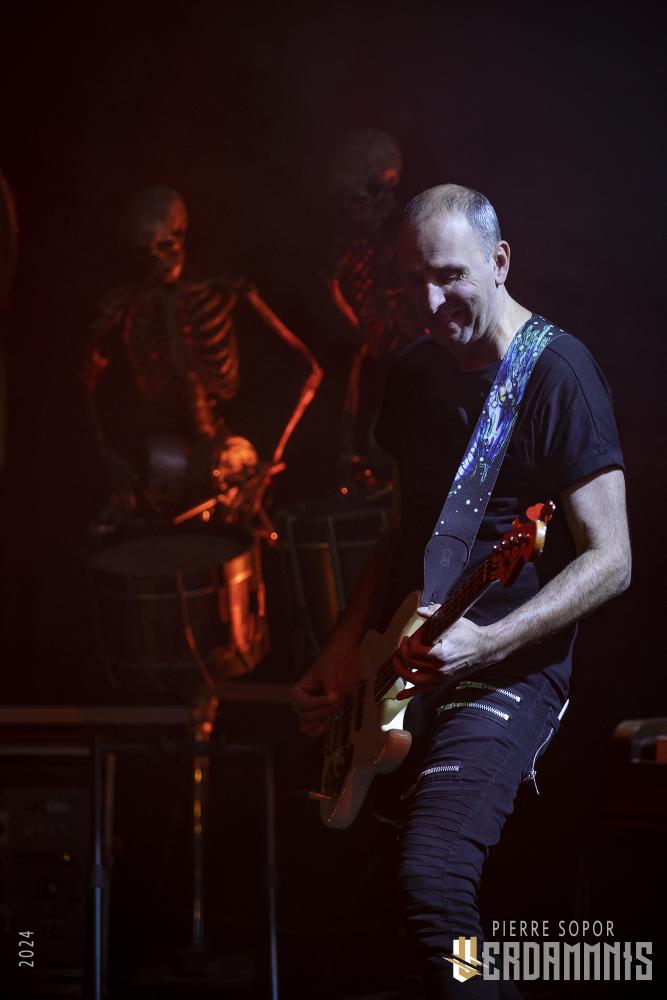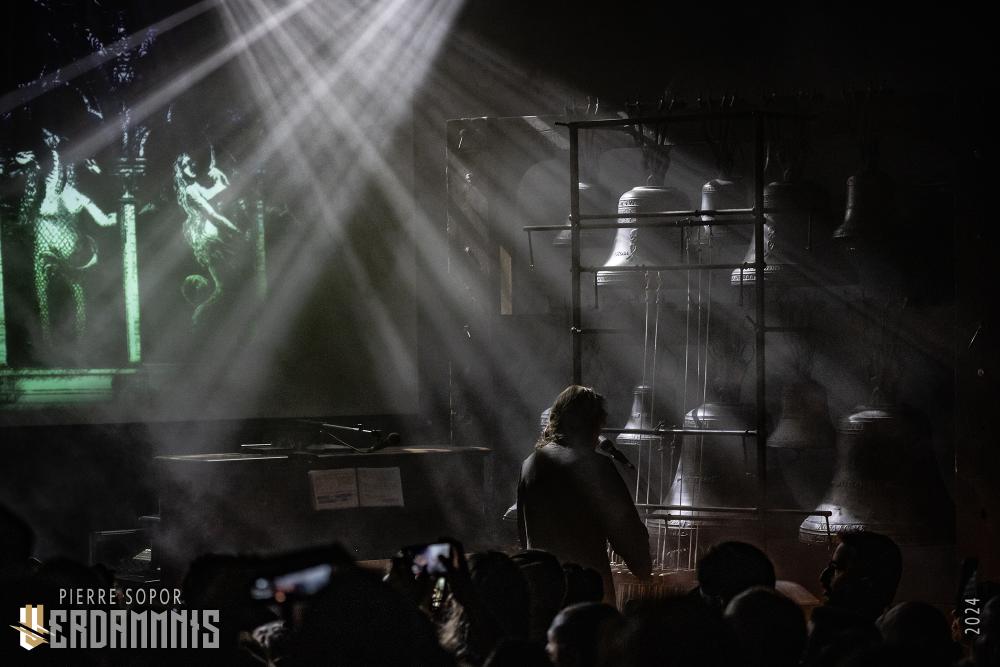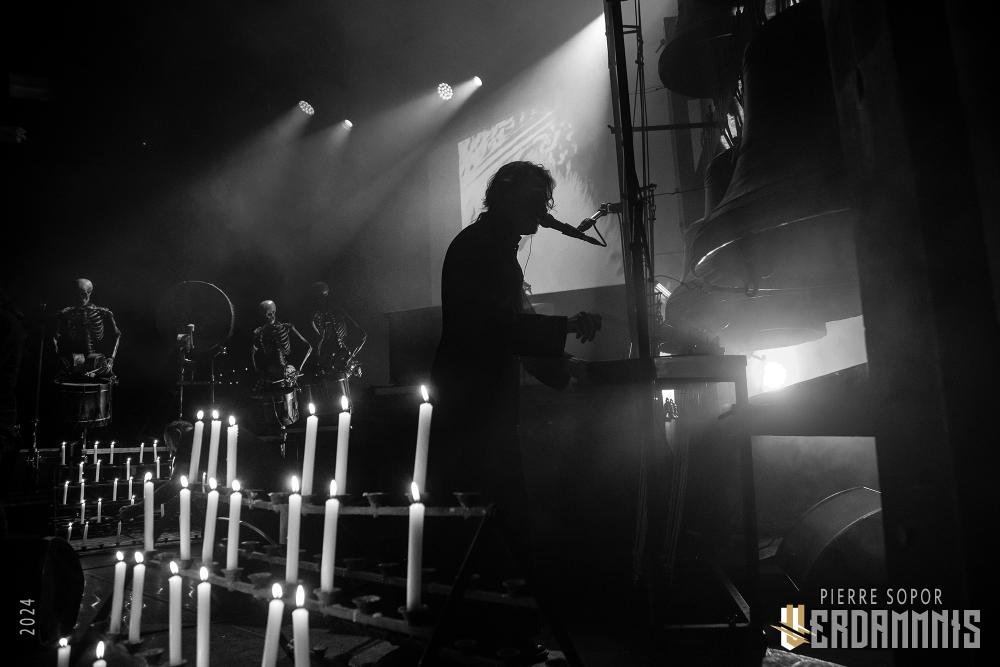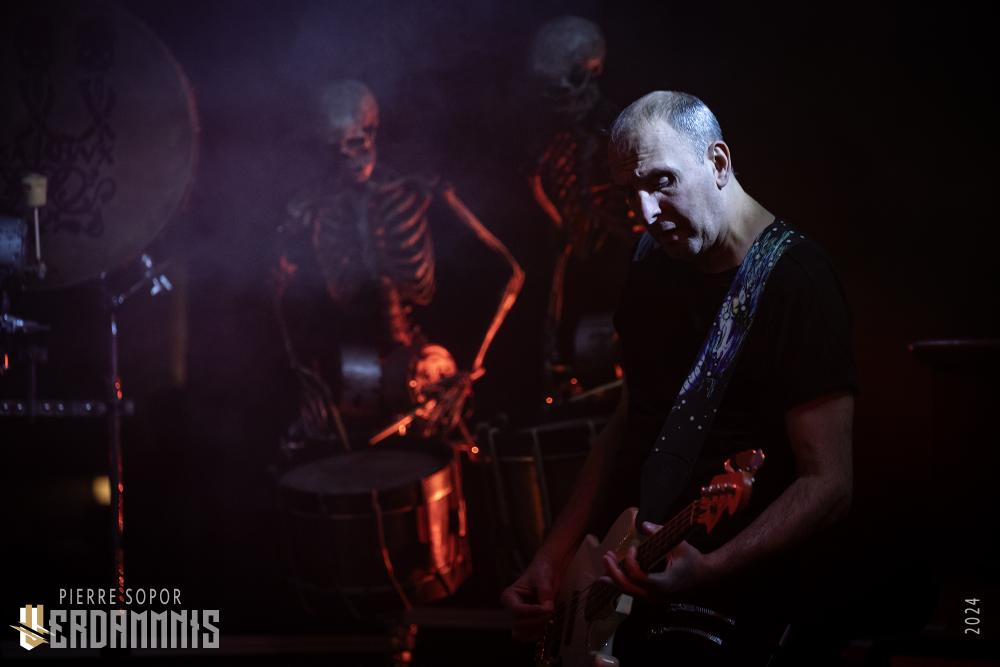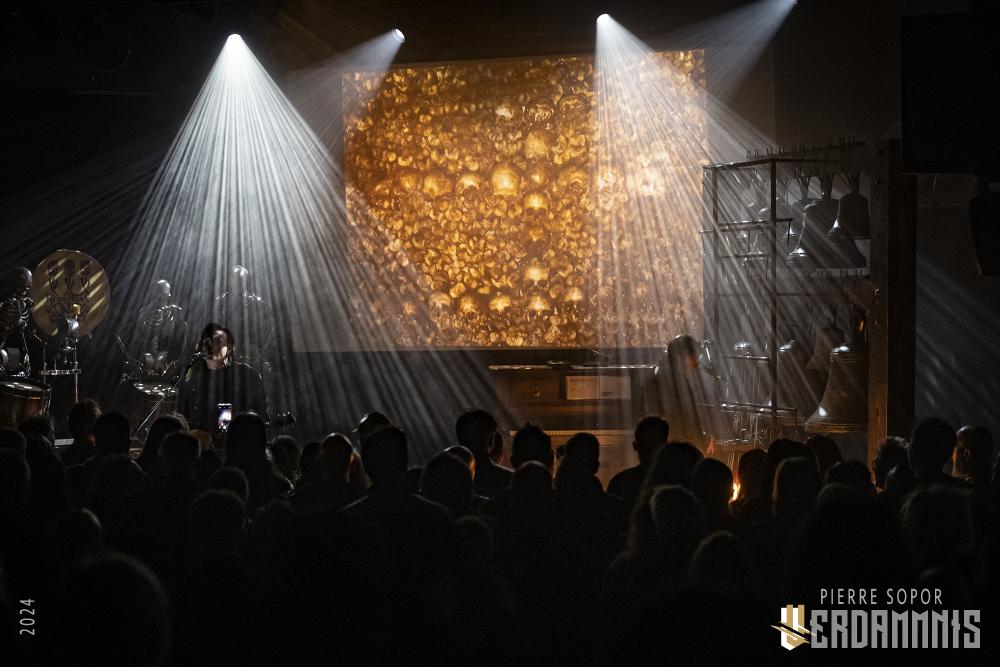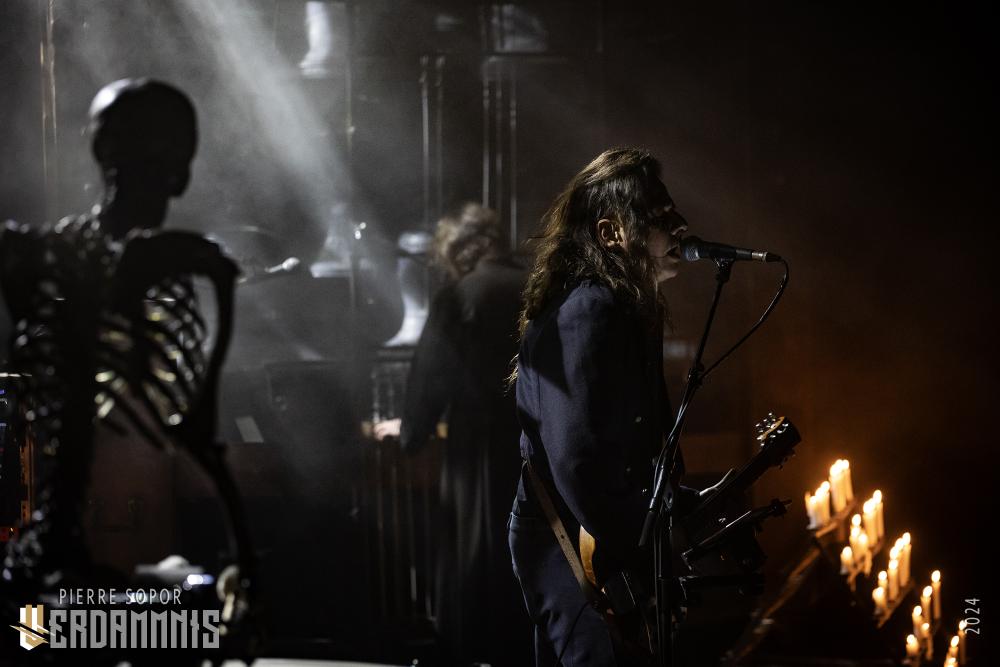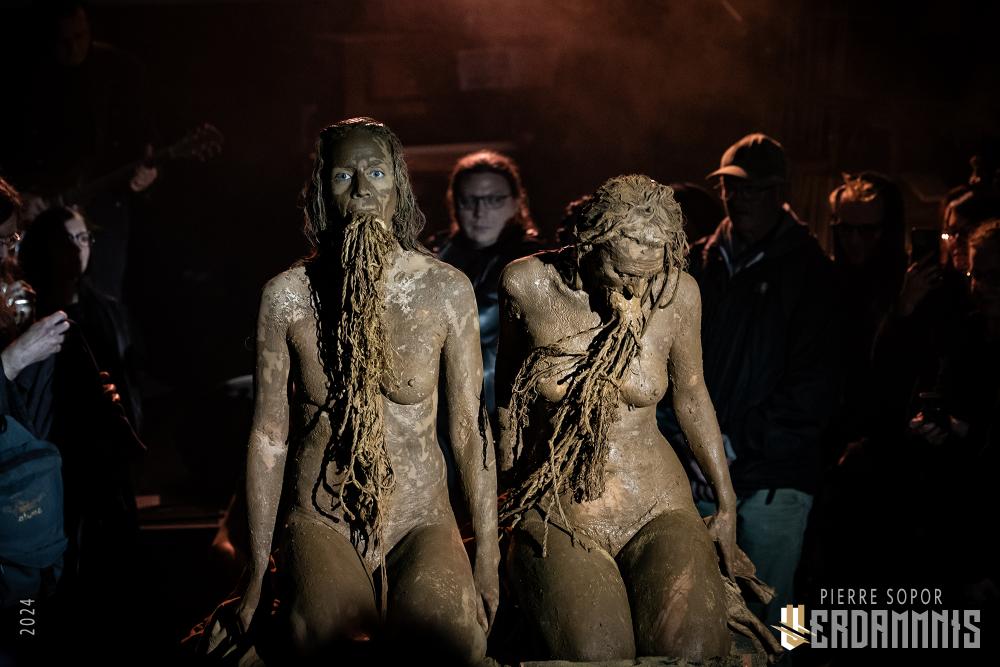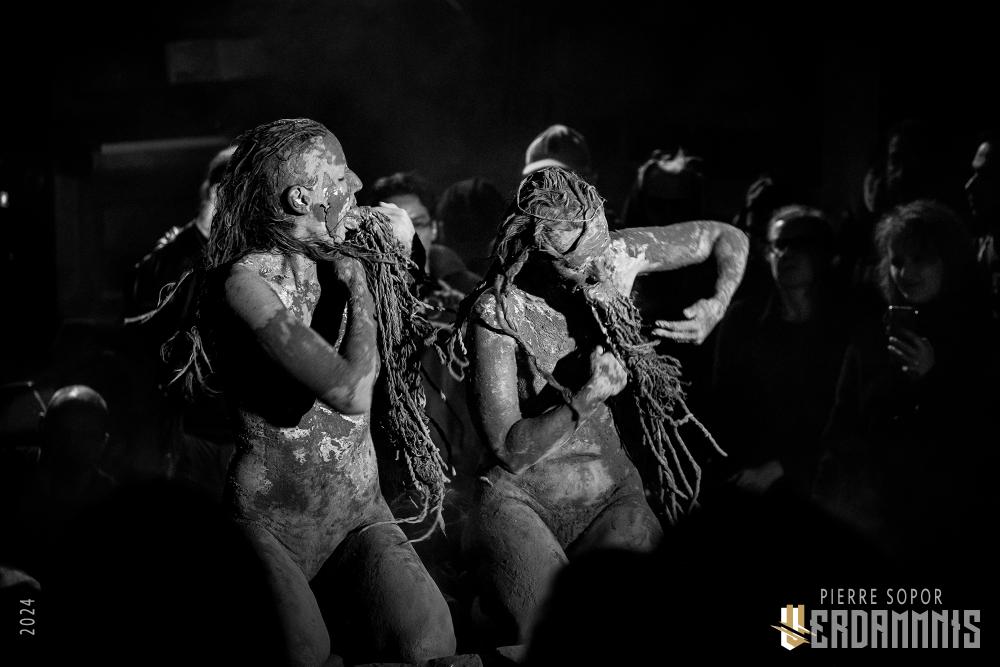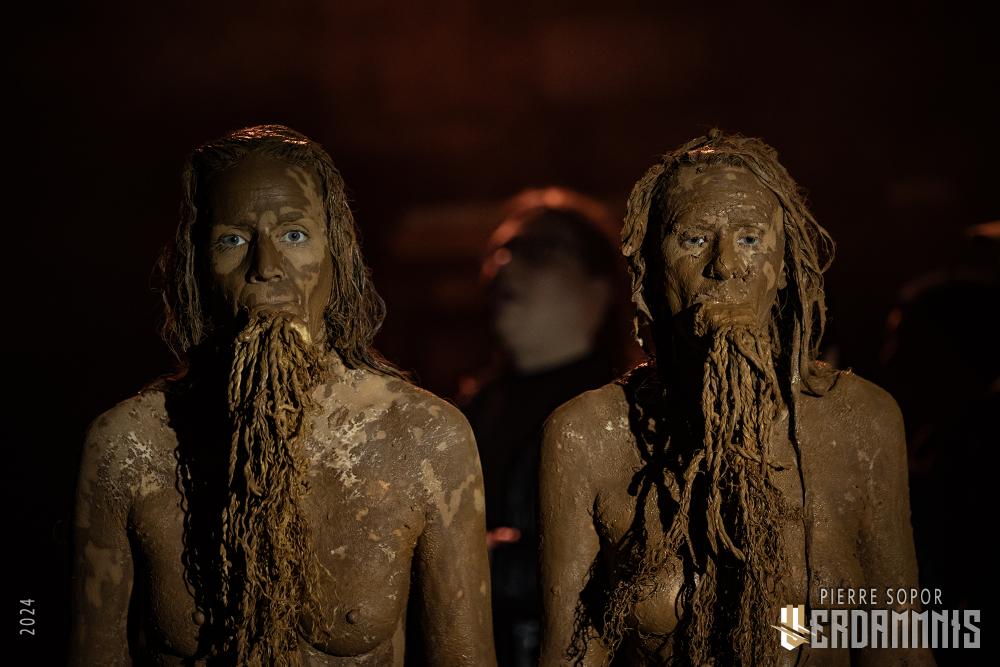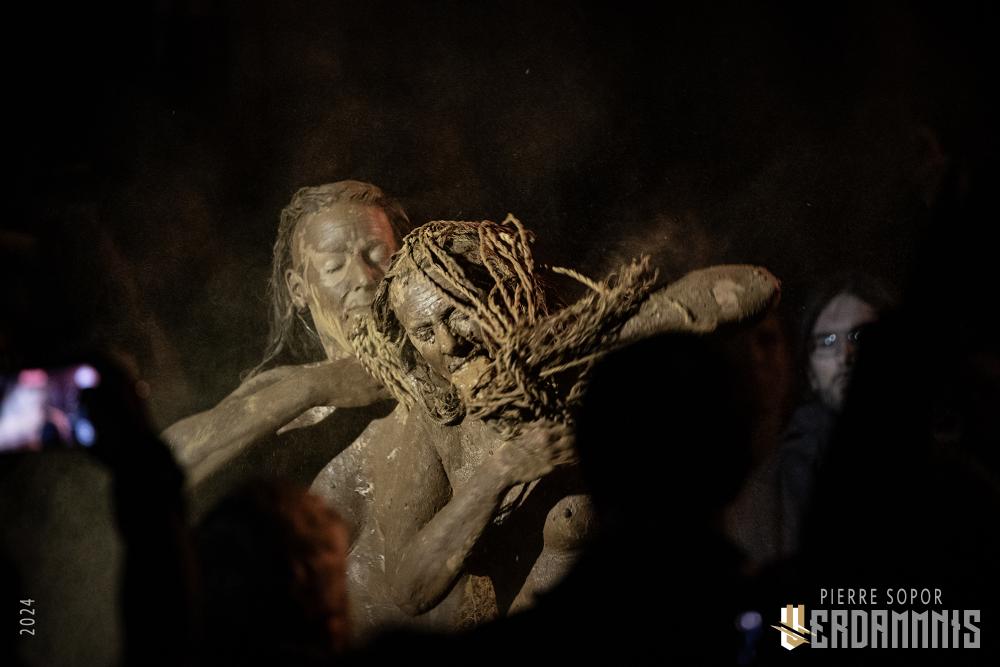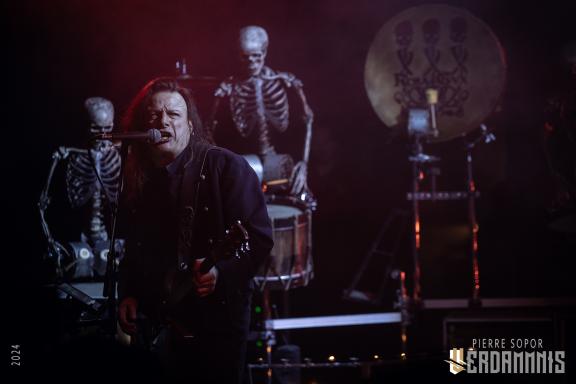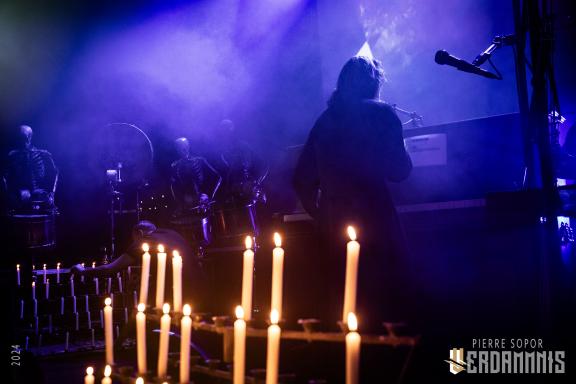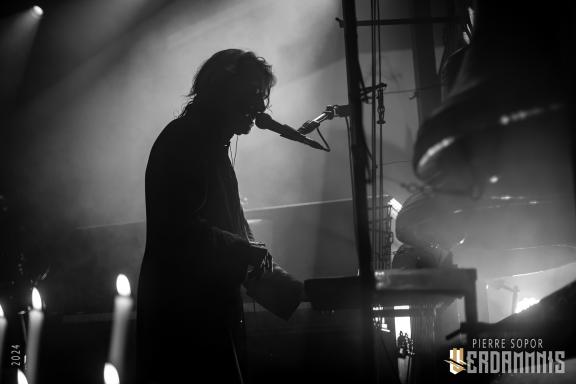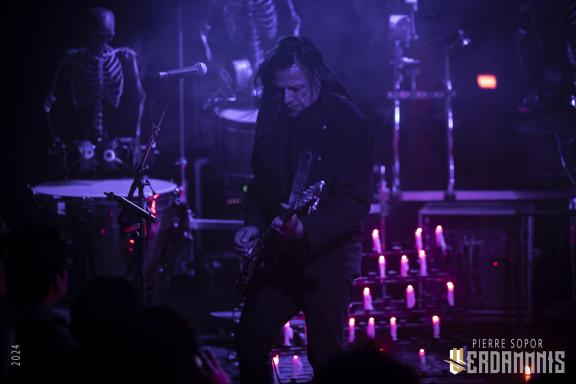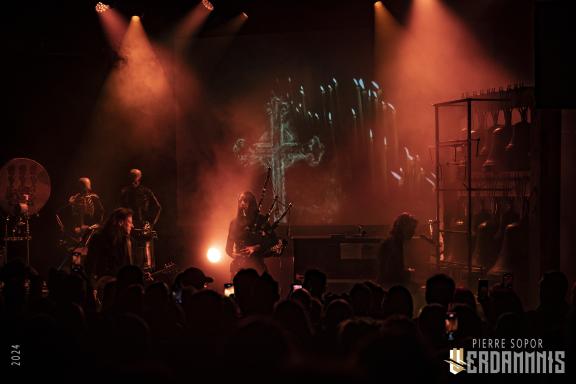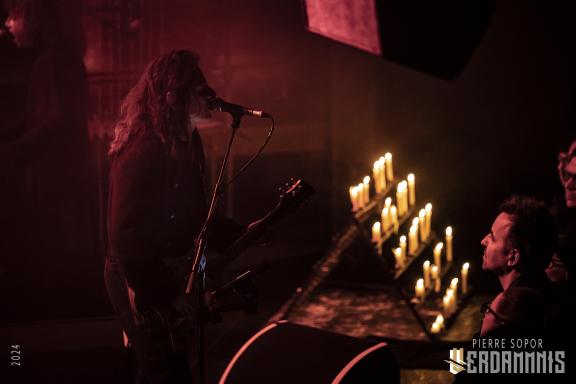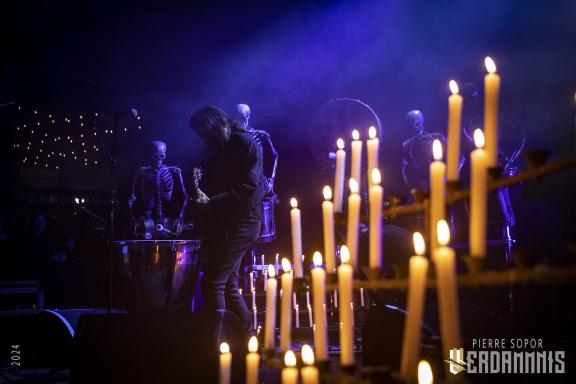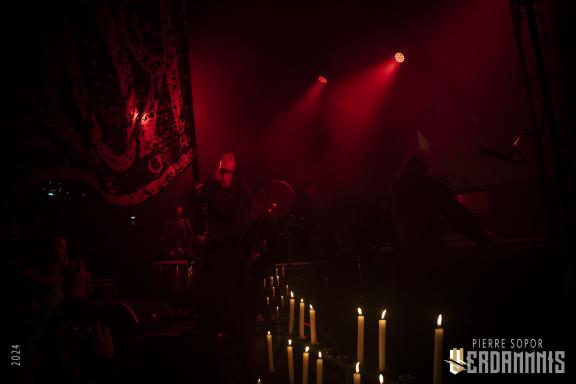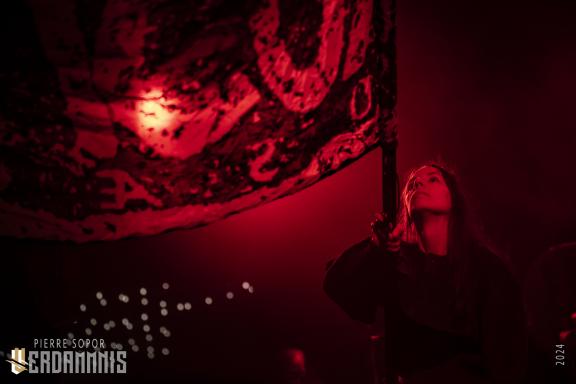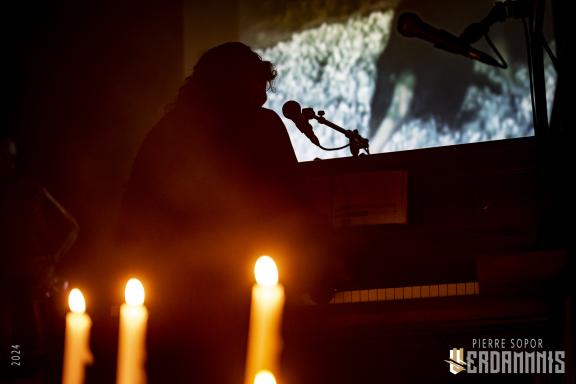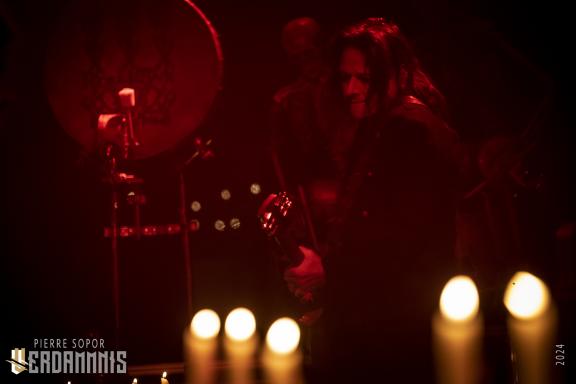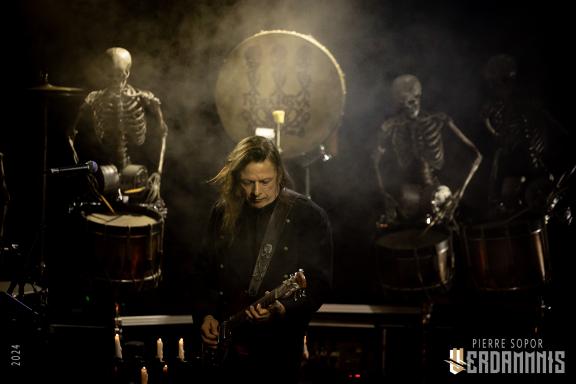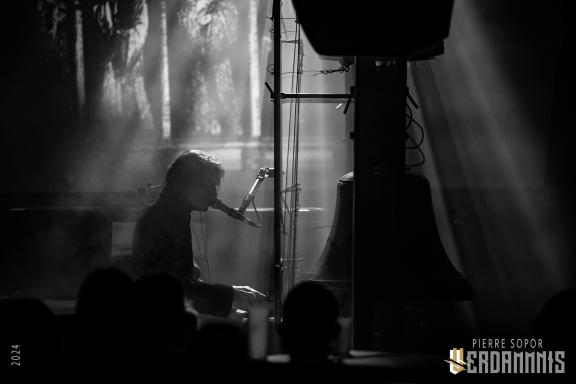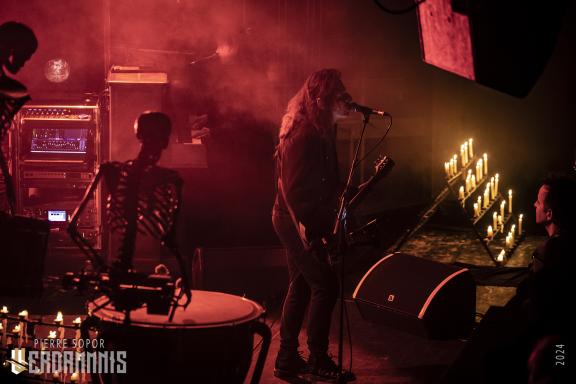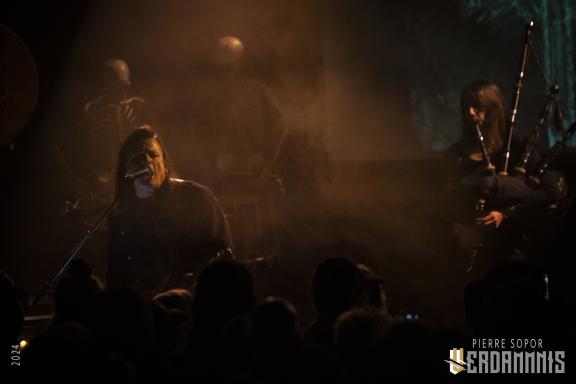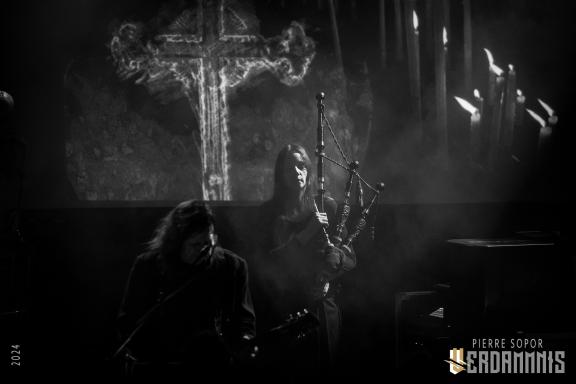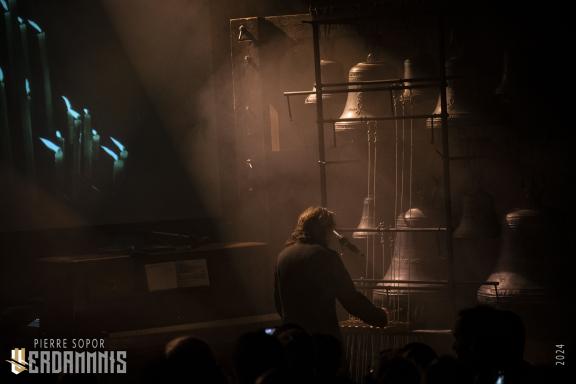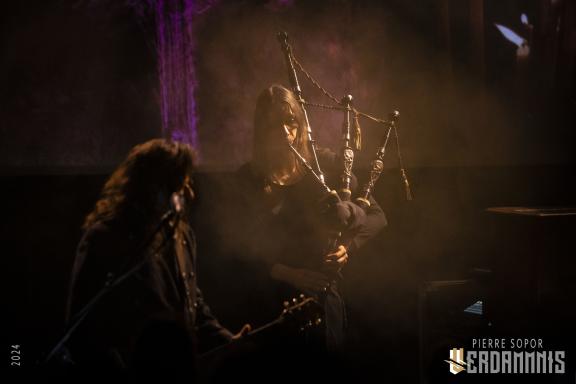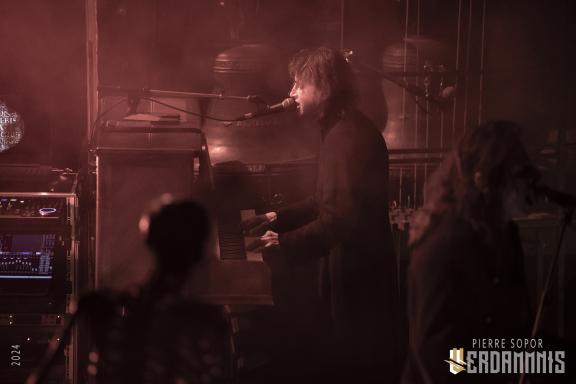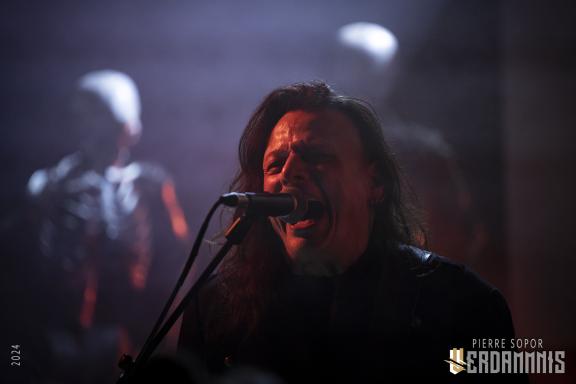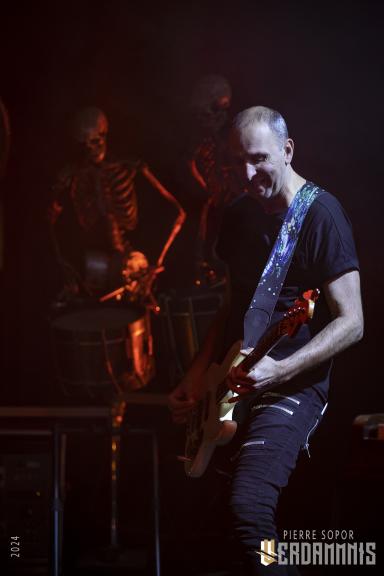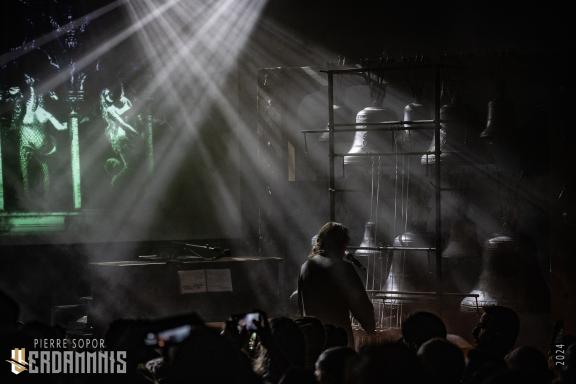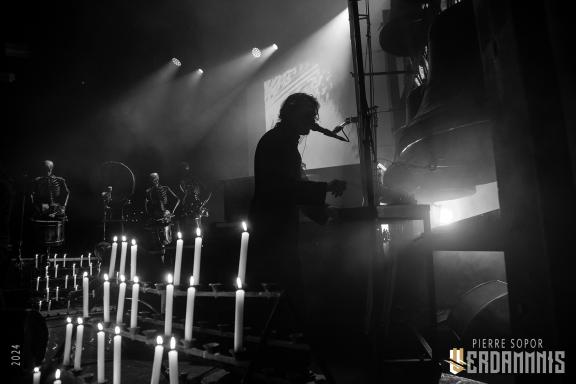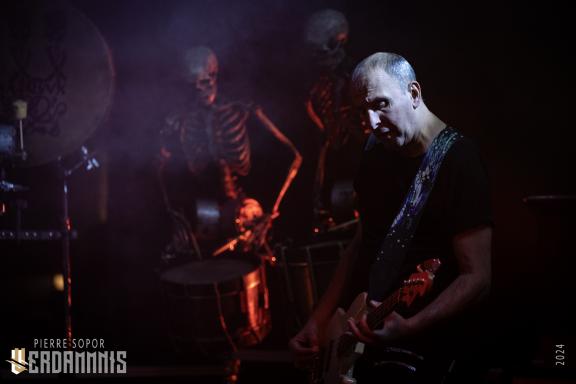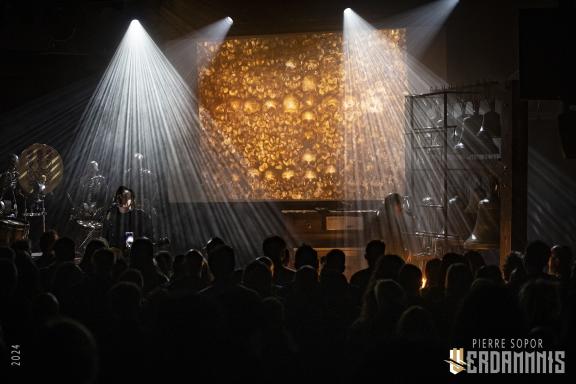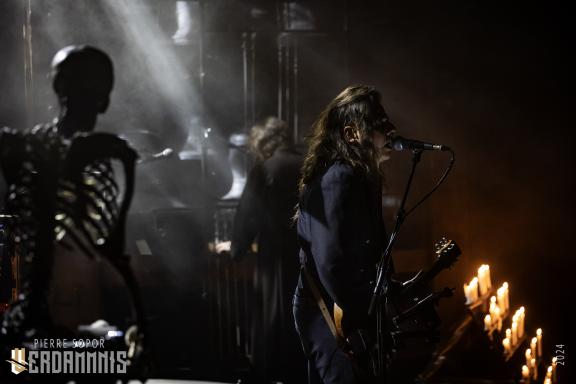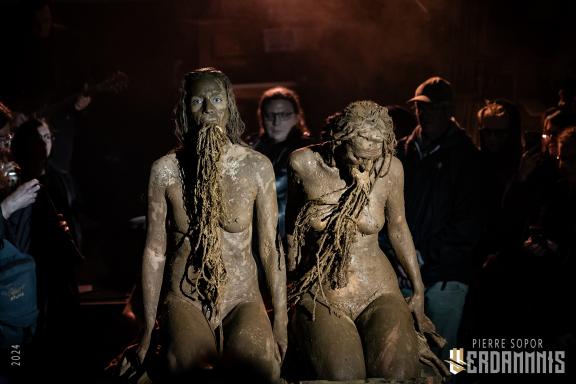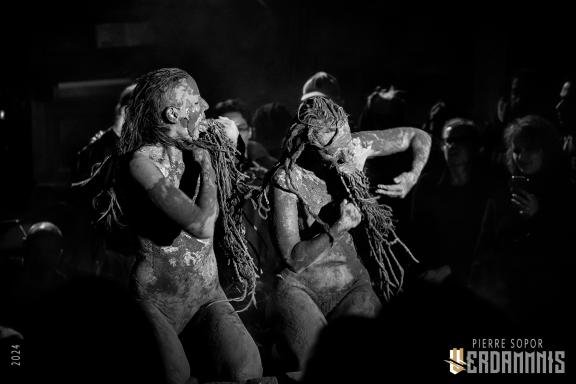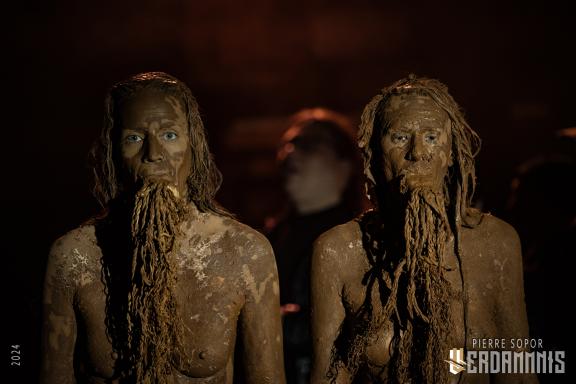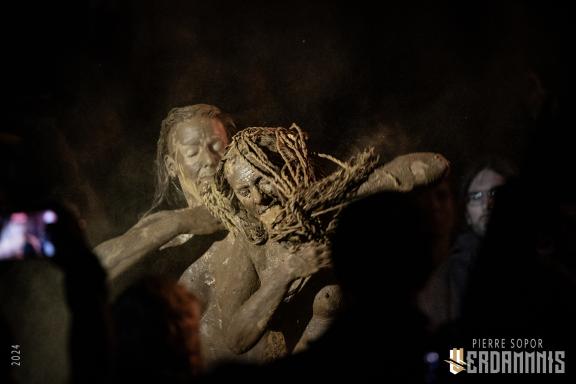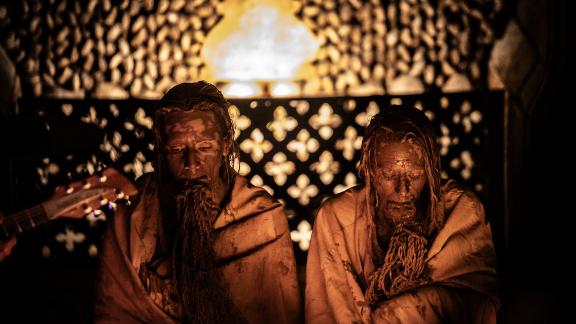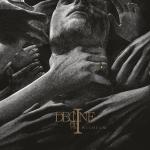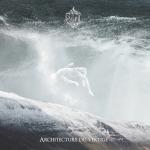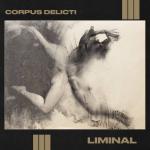Rosa Crux is a rare crow, especially in Paris where we haven't seen them for ten years or so. So let's thank the support of Persona Grata for organising this wonderful evening in a Trabendo which, it has to be said, wasn't really sold out. Too bad, and so much the better: Rosa Crux has always had that mysterious aura. We're among ‘those who know’, holders or future holders of a dark secret whose catacomb scent greets us as soon as the doors open, thanks to a merchandising stand that's as well-stocked as it is impressive, a beautiful cabinet of macabre curiosity.
DEAD MAN'S HILL
In the unlikely event that some got lost and ended up there by chance (‘we saw the darkness and went in’), any misunderstanding is quickly cleared up with Dead Man's Hill: yes, it's going to be ‘one of those evenings’.
Alone on stage, the Belgian artist partially hides his face behind a half-ripped mask, revealing his mouth. The intriguing effect gives the impression of meeting an alien version of Joseph Merrick, aka the Elephant Man (whom Lynch renamed John in his film), a presence that is both disturbing and bizarre. Martial percussions, funeral atmosphere: we're right in line with the theme of the evening. He declaims his lyrics, and the overall tone is one of defeat and threat. It's sinister, often oppressive. The half-light and the respectful silence of the audience allow you to immerse yourself in this opaque fog of sound from which emerge some times baroque melodies, always emotional and far from the cerebral austerity we sometimes imagine when we use labels like ‘dark ambient’. Naively, when we saw ‘Dead Man's Hill’ on the flyer, we thought the name might have been chosen as a tribute to Sex Gang Children... But this was a far cry from the batcave outfit's offbeat antics, and the set was captivating.
THE DISEASE
Drum machines, icy synth strings, dark and sober presences... Deathrock duo The Disease are no strangers to the dark underground. Vincent K (Babel 17) and cabaret singer Léo de Saint Germain, who some might already have crossed paths with in various goth/industrial projects, take to the stage in all simplicity : it's now their turn to enjoy the decor provided by the bells and skeletons of Rosa Crux.
Their music favours restraint, and the atmospheric and instrumental origins of the project are clearly evident. This leaves room for interpretation, with Léo de Saint-Germain lending a kind of sepulchral authority to the lyrics, which she declaims in English, German and French in a voice that warms the coldness of the electronics. On Nirgends, she's accompanied by a little doll: you can tell there's something magical going on here. With its funereal incantations and gloomy melancholy, The Disease strike the right balance between minimalism and gothic theatre, rigour and tormented expressionism to better hypnotise its attentive audience.
ROSA CRUX
Even iff Rosa Crux owes its name more to the duality between the symbols it contains (life and death, love and hate) than to the famous secret order of the Rosicrucians, mystery and secrecy are pretty much the hallmarks of this Rouen-based band. Their live appearances have been as memorable as they have been rare, nurturing a very special aura over the decades: you don't go to see Rosa Crux to dance carefree to 120 bpm hits.
On stage, Olivier Tarabo is always accompanied by Claude Feeny, uncompromising mistress of the piano and the impressive chime. While there are many things to admire at a Rosa Crux concert, it is perhaps her presence that ultimately fascinates us the most. With her back to the audience, her austere silhouette and closed face, she exudes the intimidating authority of a religious leader... You could easily put her in charge of the dance school in Dario Argento's Suspiria. Like an injunction, the two together chant Venite (‘come!’), ordering their audience to join them, but which the ear could also pass off as an accusatory and prophetic ‘vanity’ that doesn't stand out among all those bones.
Rosa Crux play with words and meanings, appropriating ancient liturgical texts. Nothing is served up on a platter, everything is opaque and sounds like incantations, litanies, secrets exchanged by candlelight. Yet the sound is full and powerful. The martial rhythms of the emblematic B.A.M. (for Batterie Acoustique Midi), this ensemble of automaton skeletons in charge of percussions, impose their icy rigour and a heavy funeral mood. Olivier Tarabo warned us at the start of their set that this date was close to their hearts, and that they had worked hard to make sure we were in for a real treat. The promise is kept and the ritual follows its course, unchanging, according to its own obscure codes.
Ritual music, martial music, neo-classical music, folk music... Rosa Crux eludes classification. You'll appreciate the depth of the guitar, whose screeching sounds resound with the solemnity of a funeral march (the poignant Adorasti, towards the start of the set, and even though a flag is waved, we imagine them at half-mast). The automatism of the percussion, far from being a simple gimmick, contributes to this feeling of fatality: the condemnation is coming, implacable. In the half-light of the Trabendo, you're carried away by the intensity of In Tenebris, the pleas of Omnes Qvi Descendvnt, the melancholy of Proficere and the possessed, frenzied anguish of Vil.
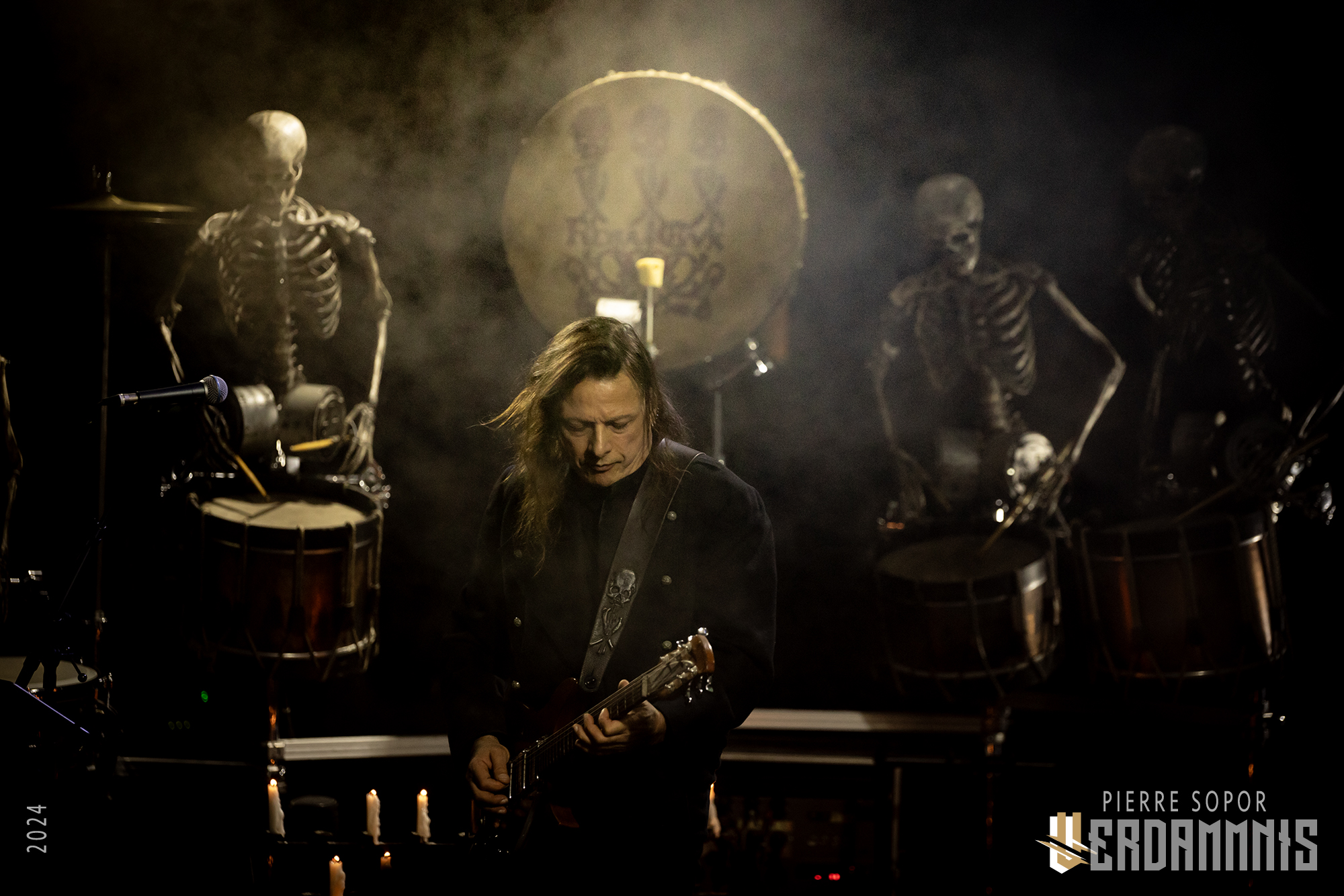
Death is omnipresent: in addition to the ‘skeleton musicians’, there are the projected videos. Ossuaries, rats, rotting corpses... Beyond the tomb-like fragrance, this underlines the sacred tone of the concert, constantly exploring the greatest of mysteries. The mood is one of contemplation as we are systematically reminded of our futility. Out of this darkness, however, a few glimmers of light emerge. Whether it's in the rare flashes of light that filter through the music like a moonbeam through a stained-glass window, creating a contrast that better highlights the darkness, or in the smile on the face of Frédéric, DaGeist ‘s bassist, who is a guest for two tracks.
The climax of the show is expected, and the concert ends with the Danse de la Terre accompanying Eli-Elo. Two women, stripped naked and covered in earth, launch into a dance that is at once cathartic, primitive and mechanical in its repetition of gestures. Kneeling on a table in the middle of the audience, they seem to be offering themselves as a sacrifice, placing the audience in an ambiguous role and turning us poor mortals into actors of this ritual. At the back of the venue, the forbidding gaze of the security staff, who were perhaps naively hoping that the drumming skeletons would be the most unusual thing about the evening, is also worth the diversions: as we said earlier, it's ‘that kind of evening’.
After a long and generous set, it's time to head back out into the night, which finally seems quite bright after such a concert. Rosa Crux have long claimed to be working on a new album. Several of the tracks played tonight have not appeared on any of their previous releases, and after more than twenty years this ‘new release’ is still a long time coming. Rosa Crux is a project of daunting ambition and richness and yet, despite its ‘cult’ status (in every sense of the word), confidential. It was at once terrifying, sublime, oppressive, introspective and grandiloquent. Let's hope their next visit to Paris isn't ten years away!

